#well for a certain value of meta...
Text
Getting a little emotional over Colin and Jamie in 3x09, what with that long hug and the “I love you so much, man”. because Colin was one of Jamie’s side-pricks way back when, and that’s different from, say, Sam being the victim of Jamie’s very overt bullying (not that Colin escaped the vicious barbs by being a sycophant; jaundiced worm and everything). Like, the anger you can feel towards someone that did not only treat you badly but also inspired and encouraged your own bad behaviour? Yeah. Sometimes being complicit in the nastiness makes it even harder to forgive.
Yet here they are, and not that much later. And it’s not just them being fine with each other, either, not just them getting along well enough to make do: it’s Jamie saying we got you and then holding and holding and holding Colin after his stellar perfomance in that match, and Colin telling Jamie that he loves him so much. However unequal and destructive it started out, it’s such a great thing for both of them now, and I do love that.
#colin hughes#jamie tartt#colin and jamie both have this sassy himbo vibe#OF COURSE they’d get along like a house on fire#once jamie stops being an asshole#and colin feels confident enough not to just go along with whatever#i am so so interested in how colin navigated jamie’s return#because he was initally among the most angry and vengeful#and i do think that part – though certainly not even nearly all! – of that is him struggling with his own guilt#or distaste of the person he'd once been in part because of jamie tartt#delicious complicated feelings...#3x09#meta#well for a certain value of meta...#happy midsummer y'all!
185 notes
·
View notes
Note
One day I will cry long enough to make you feel so sorry for me you will write that meta about heteronormativity of marines
aw, you don’t have to cry! asking nicely is all it takes.
so, when i say the marines are a rigid, heteronormative institution, what do i mean by that?
they work in the service of a heteronormative government and society—the world government, and the world nobles, who consider themselves superior to the rest of the world because of their bloodlines
they have heteronormative values—among them strictly defined gender roles and prioritizing relationships based in blood/deprioritizing all others
they use those values to dictate how the ‘civilized’ world should behave and assume that everyone shares those values, marking those who do not as uncivilized, criminal, and rebellious
more details below the cut.
any kind of royalty or nobility that defines itself as superior to the masses because of their bloodline, ancestors, etc. is going to be particular about having proof of that blood connection. if you think your blood makes you better, you better have documentation of it, family trees going back eight hundred years so no latecomers can doubt your importance.
they’re also going to care deeply about the “sanctity of marriage”—not because it’s actually sacred, but because if wives are cheating on their husbands then you can’t trust your family tree. and if your family tree is a lie, then maybe you aren’t actually superior to all of those dirty, common masses. the horror!
lastly, they have to care deeply about children. because, until someone develops some kind of immortality elixir, the only way to keep your very important family going (and it has to keep going, or what’s the point of any of this?) is to have children. and you’re going to prioritize biological children over any other, because if the child doesn’t have your blood, they aren’t really superior to the masses.
(the exception: note that the child sabo’s parents adopt when he runs away is chosen for his aptitude in school and his higher status biological family. bringing fresh blood into your family that improves your status is always beneficial, whether it’s through marriage or adoption.)
so. special bloodlines, preserved by marriages that produce biological children. until someone develops alternate methods of reproduction—which is not out of the question in one piece—all of that requires heterosexual relationships. they have to be the priority, in order for the superior bloodlines to persist.
thus, the prioritization and normalization of heterosexuality by the world nobles—and therefore the world government that serves them—and therefore the marines that serve them.
.
what about those heteronormative values?
well, look at female marines. there aren’t many of them; even if you’re only thinking about named marines, women are outnumbered nearly ten to one. and the unnamed background guys are always guys, so actually it’s an even greater disparity. why? because a woman’s place is in the home. she should be a homemaker and mother, because continuing the family line is the point of a woman, according to the nobility’s heteronormative view of the world. going against that is to set yourself up for a struggle. and a number of these ladies do struggle.
bell-mère had to leave the marines to keep her kids, taking on a job with a highly variable income that left her nearly starving at times; men in the marines have no such trouble, though whether that’s because of narratively invisible wives or these men not caring if they raise their children well is unclear.
tashigi has an enormous complex over being treated differently because she’s a woman, and it’s not a complex that comes out of nowhere—she is treated differently. most of her opponents beat her easily and then let her live for no good reason; as a captain she’s idolized, not respected, by her crew.
then there’s characters like hina and tsuru, whose presence high up in the military structure is acceptable because they have powers that put their opponents into submissive, humiliating positions. you don’t see a female marine with one of those elemental devil fruits; no, they have to have a fruit with a power play component to it. because god forbid women hold positions of power if they don’t have a bit of a dominatrix energy to them. (actually it’s because they’re being subversive in service to the state and the status quo, which makes them acceptably quirky rather than rebellious, not unlike members of SWORD, or our single female warlord.)
.
and then there’s the prioritization of bloodlines.
we see that value most clearly in the paramount war, where ace is executed not because he’s the second division commander of the whitebeard pirates, not because of any crimes he’s committed, but because of who his father is. a man who died long before ace was born, a man ace hates because of the awful opinion the civilized world has of him (and therefore his kin), a man who had no influence on ace in any way but blood. that’s enough reason to kill a man, by the marines’ logic.
and the man ace does call father, who embraced ace and gave him a loving family? well, that man, as far as the marines are concerned, only took ace in to put him on the throne of the pirate king, making himself the power behind the throne. (because naturally a king’s son should inherit his throne! never mind that whitebeard’s power far outstrips ace’s—surely pirates would only bow down before their king’s rightful, blood heir—and the marines can’t allow for the pirates to unify under one man’s leadership like that.) to the marines, ace only has value as roger’s heir, and so they expect that to be all the value he has to anyone.
and this backfires on them. the betrayal from within the whitebeard fleet (which the marines orchestrated) operates on the assumption that whitebeard will prioritize ace over the rest of his fleet. but all of the whitebeard pirates are his children, and he makes that clear when he gives them an out, allowing them to abandon him to his death if they so choose. the marines wanted to show the world that even this benevolent father figure of a pirate captain was a monster deep down, but they couldn’t pull it off. they don’t believe whitebeard is sincere in his affections for his ‘sons,’ and that costs them the narrative they wanted for the paramount war.
.
there’s also this one-off line that i rediscovered while rereading impel down/marineford to prep for this post, which in retrospect explains garp’s manic insistence on his grandson becoming a marine.
in chapter 530, hearing that luffy’s broken into impel down, sengoku shouts, “if you weren’t called ‘the navy’s hero,’ i’d make you pay for the sins of your entire family, garp!” as a counterpart to it being just and lawful to kill people for the crime of being related to a sufficiently dangerous criminal, garp and others like him believe that if you serve the state well enough, you can be forgiven for the crime of being related to a criminal.
if luffy (and ace) had just become a marine, garp thinks, then the identity of luffy’s father wouldn’t matter.
which strikes me as very naive. of course it would still matter; blood is the only thing that matters to these people.
#one piece#my meta#*marines & heteronormativity#shoulda made that a tag ages ago; now i can’t find the posts where i vagued about this stuff before. oh well.#anyway. didn’t quite get into everything i wanted to here#like the way certain homosocial behaviors have to be explained away as familial under a heteronormative system#or how many of these shitty values are intentionally written as such vs being shitty values oda himself holds & upholds through his writing#(like the gender stuff… that’s almost certainly oda being sexist himself rather than trying to write a sexist society & military…)#but i am v tired and i want to post this before i go to bed. maybe i’ll revisit those ideas another day.
5 notes
·
View notes
Text
no really I was just meant to look a bit into Duggan's Marauders and LW's X-Factor but I ended up mesmerized by HoXPoX and even with Hickman's departure the line somehow got even better (bless Ewing and Gillen and Vita and LaValle)
like this is definitely one of the best eras for X-Men comics. I know it will inevitably end but I'll enjoy it while I can lmao
#personal#I'm done being bitter about big two books I guess? I think my old perspective was somewhat immature#you're better off accepting there are cycles of quality and embracing certain “layers of meta” (?) that come with the collaborative work#(“layers of meta” as in continuity will always be imperfect and convoluted#but writers commenting on each others' stories and themes have its own value etc.)#though when I say "best X-men books in ages it's like... the books are def more refreshing and daring in some aspects#but things like the heavy interconnectedness and intense sequece of events still remain#so it's still kind of... hard to recommend to newcomers who aren't used to the heavy continuity#but at this point we're better off accepting heavy continuity is a part of this line's appeal#and we have writer super well-synched with each other so . it's the best you can get from this concept really
0 notes
Text
Okay, this is 1600 words of (positive!) meta regarding the OFMD finale. Included is character analysis and a treatise on why a certain trope people keep throwing around does not apply here.
This is of course just my take, and I'm sure people will disagree, but I needed to get this out. Apologies if it comes off disjointed, I've had like no sleep.
Spoilers within, obviously. You have been warned. Heed the tags. I didn't tag any characters because I consider it a spoiler, but you know who this is about.
Listen. Listen.
Let me start off by saying I have been where you are. I’ve had beloved characters die, either because it was important to the narrative or for shock value. I’ve been there, so I’m not coming at this without empathy. I’m not an Izzy hater. I loved him as a character. I’m truly sad to see him go.
But from what I’m seeing around Twitter and tumblr, some of you do not understand the role of an antagonist in a story.
Izzy was always meant to die. The moment he said, in the first season, “the only retirement we get is death,” I knew he was meant to die in the end. The foreshadowing ran through both seasons. Izzy was the true antagonist of S1. He was there to keep Blackbeard tethered when he started pulling away, and yet he also set the plot in motion. He inadvertently introduced Blackbeard to the person who let him be just Ed. He put Ed on his own path to redemption without even knowing it.
S1 ended with Izzy getting what he wanted as Ed lost everything he had. S2 was about Izzy coming to terms with the fact that he’d gone too far, he’d turned Ed into a monster. It wasn’t what he wanted. He wanted Blackbeard back, just like old times. Instead, he got the Kraken, and it was more than he bargained for.
Especially after it cost him his leg and he realized how far gone Ed really was. The conversation that ended with Izzy’s half-assed suicide attempt was the final blow to Izzy—Ed really didn’t seem to care anymore. Where Izzy wanted him to stop giving a shit about his silly boyfriend, he instead got a Blackbeard who didn’t care about anything, and he was apparently now included in that category.
(I said half-assed suicide attempt because Izzy wasn’t meant to die then, THAT would have been an empty, pointless death. It wouldn’t have taught Ed anything—in fact, all it did was make him more self-destructive, which was Izzy’s purpose to the narrative, but not his endgame. That Ed thought Izzy killed himself pushed Ed to the brink. Ed wanted to die and take every scrap of Blackbeard with him. Had Izzy successfully killed himself, Ed and the Revenge would be at the bottom of the ocean.
It wasn’t until the crew left Izzy the unicorn leg that he realized the power of compassion, the incredible act of grace from a crew that suffered so much from Izzy’s own machinations and didn't need to forgive him. It moved him to tears, and it moved him to accept that maybe it wasn’t such a bad idea to let people in, to let himself be cared for. It was a foreign concept and something Izzy likely hadn’t experienced since losing his family (I fully expect a shit ton of fanfic of Izzy’s life before piracy).
Israel Hands found the capacity to let love all the way in and by god, did he pursue it.
But, again, Izzy was always meant to die, and I’m glad they stuck to the narrative they set out with instead of placating fandom and letting our influence dictate how they told this story That’s never good, trust me. Fandom should not influence a creator’s decisions regarding their own characters. It rarely if ever ends well.
[Stares in Voltron S8]
And I see a lot of people out here throwing the “bury your gays” phrase around—I beg you, please look up the definition of the trope. Izzy didn’t die because he was queer, he didn’t die because of his disability. He wasn’t one half of the only queer couple in the show fridged for shock value. He wasn’t killed off due to pressure from conservative viewers. He wasn’t the only queer, disabled character.
They didn’t kill off Lucius, or Jackie, or Wee John. Would you be as outraged if it was any of them?
Killing Eve is bury your gays. Supernatural is bury your gays. Pretty much any film, book, TV show, whatever, where a queer character dies because they’re queer, of AIDs, to further the narrative for a straight person, etc—that is burying your gays.
Izzy’s death was none of those things. Izzy’s death had meaning.
Izzy’s death freed Ed from the Blackbeard persona. It finally forced Izzy to say the things he couldn’t say until he realized it was his last chance. Izzy was also tired. I honestly think he stuck it out for Ed’s sake, because he was afraid to let Blackbeard go without making sure Ed would be ok.
He loved the idea of Blackbeard, but over time, he learned to love Ed. He finally understood what Ed tried to tell him the whole time.
“Fuck off, you twat. You’re surrounded by family.”
You’re safe. You’re loved. You don’t need me anymore. You don’t need to be reminded of who you’re capable of being, you need the people who will guide you to who you will become, and I’m not one of them.
I know a lot of Izzy fans are stung by his death, some of you are deeply upset. I get that. Like I said, I’ve been there. Sirius’s death made me throw that fucking book across the room. That Fucking Woman™ killed off my entire OTP, purely for shock value and, imho, a direct response to shippers. Trust me, I have felt betrayed by a creator for their decisions.
But I need you to understand that no, this was not a personal attack, this was not malicious, this was not “bury your gays." A show that celebrates queerness and diversity is not suddenly homophobic and ableist because your favorite character died and happened to be both of those things. But when the majority of your cast of characters is different in some way, and they’re in a show about 18th century pirates, you have to accept that one of them could, in fact, die. “Anyone Can Die” is also a trope and the more accurate one to describe E8.
If only being queer and disabled made you invincible.
Spoiler alert: it doesn’t.
And no, I’m not an Izzy hater. I loved him, I loved him as an antagonist, and I loved his redemption arc. He was fascinating and Con put his whole O’Nussy into that part. I’m sorry to see him go, but as a mystery writer who often has to kill off beloved characters, I understand that he served the purpose he had from the beginning.
I swear, if some of you had your way, there’d be no conflict at all in any form of media. This what a steady diet of nothing but fanfic gets you. This is not a fluffy one-shot with magical healing dick and a happy ending where everyone sails off into the sunset. If that’s what you wanted, what you headcanoned, you did this to yourself. It’s not David et al’s fault that we took that character and babygirled him. That’s the risk we take when we decide to love a specific character, when we take a genuinely terrible person (in S1) and woobify him.
So, please stop harassing and attacking David, Alex, et al. David did not and should not change his story to placate us. The fact he went ahead with it despite the backlash I’m sure he expected makes me respect him as a creator even more.
Anyway, I’m going to revel that we have three (!) queer relationships with happy endings where one or both didn’t immediately die (again, the actual definition of “bury your gays”) and that we got at least two seasons of a little show that celebrated individualism, diversity, queerness, compassion, and love.
In the end, it all came down to love.
“There he is.”
Goodbye, Blackbeard.
Hello, Ed.
#ofmd spoilers#ofmd season two spoilers#ofmd finale spoilers#ofmd finale#Meta#ofmd s2 spoilers#our flag means death
786 notes
·
View notes
Text

Okay, I obviously made the above post as a leetle joke, but since it's getting not insignificant traction, I do want to offer a more serious note.
I love this about Arthur. It's probably my favorite thing about him, but let me use this fresh new RDR2 meta post to clarify exactly what I mean. Despite the aspects of his personality & appearance that are traditionally hypermasculine, and despite how often he is annoyed with people (especially incompetents or people who meddle with his plans), Arthur is decidedly NOT annoyed by the social performance of femininity or by traits that are/were frequently stereotyped as feminine. Ever. Regardless of subject. I might go so far as to say he seems to canonically prefer hanging out with women and with "feminine" men.
Your long-winded, bullet-pointed analysis is below!
The Girls. Most noticeably, Arthur actually sits down to talk with and actively confides in the camp Girls (Tilly, Mary-Beth, Karen) more than anyone else around. These three are the most traditionally "girly" (single, 20s, active, pretty, unattached, highly social, feminine, chatty) members of the gang, though of course they are still criminals and don't perfectly adhere to all period-typical standards of feminine comportment.
He doesn't mock the girls** like he sometimes does with other auxiliary members of the gang (like Uncle and Pearson, playful or not). Notably, he doesn't even gently tease Mary-Beth for writing her "silly" romance novels, a highly feminized hobby which she speaks about in a self-depreciating manner, much like Arthur speaks about his own artistic hobbies. Rather, he talks to her about writing like a peer and encourages her to write more by going out of his way to get her a nice pen.
Crucially, there is no canon romantic or sexual interest in any of the girls on Arthur's behalf. He just feels the most comfortable in their company and seems to value their advice/opinions on life the most. To me, this is much stronger proof than his forever-burning torch for the cultured & ladylike Mary, which is (or was once) rooted in romantic desire.
** Unless the player persists in Antagonizing them, and these lines (while sometimes shockingly cruel and offhandedly sexual in nature; see Arthur teasing Tilly about pursuing Javier) are largely about goading them for laziness or, in Karen's case, her alcoholism. That said, many of the Antagonize lines strike me as clumsily tacked-on & poorly rooted in canon, which could indicate: (1) an Arthur who is deliberately trying to be disruptive (a generous interpretation), or (2) writers instructed to add throwaway content that will make a certain type of childishly misanthropic gamer (think 13 y.o. boys) squeal in glee with relatively low impact on the overall story.

Campmates. Following the above point... who doesn't Arthur hang out with much? The manly men of the gang; the very people social mores suggest he ought to be hanging out with. Bill, Micah, Joe, Cleet, and even Dutch. (To some extent, this includes John and Sean, but I'd say John sort of lives at the edges of gang life anyway, and Sean is, well, Sean.)
Conversely, which male gang members does Arthur hang out with a lot? Sweet little bookish Lenny, a wordy, positive-energy, breezy intellectual who has just barely become an adult. Introspective, soft-voiced, long-haired Charles, who is traditionally masculine by some standards (strong, usually calm, can be standoffish) but decidedly NOT so when his appearance/demeanor is judged by the white Christian American male standards that began to dominate masculinity concepts in the later decades of the 1800s.

Algernon. Oh, my, Algernon. Arthur clearly dislikes Algernon's fancy, loud, outrageous clothing. But weirdly, he seems to like Algernon, not just tolerate him. Arthur in fact goes through significant personal discomfort to avoid hurting Algernon's feelings (the awful hat, the POST.MAN. sobbing), and he immediately says yes to having tea with him without any awareness of a coming business proposition, though half the time Arthur clearly has no fucking clue what Algernon is talking about. I am left to conclude that on some level, he just enjoys hearing Algernon talk, which is word-for-word what he says while listening to the Girls argue about romance novels ("I just like listening to you [all] talk." Hello????).
I mean, for God's sake, he meets the man while he's choking to death on a nut at a fancy party, and the second thing Algernon does is tell him he looks like a guy who wears a corset. If anything was going to set off the boiling defensiveness of a dude who worships masculinity, thirty seconds with Algie would have done it.

Margaret, Mistress of Fucking Danger. It's pretty clear Arthur doesn't like Margaret. But that has little to do with Margaret's femininity & cross-dressing (this doesn't faze him at all when Charles Châtenay does it; more on that below) and everything to do with Margaret's deceptiveness and highly selective memory. It's not until the bullshittery unveils itself that Arthur starts getting visibly pissed off at Margaret. Conversely, Arthur does seem more positively disposed toward Sally Nash. (That said, this quest has a lot of problems and poorly aged lines that are depressingly easy for a politically motivated jerkoff to soundbite and miscast as Rockstar being pro-bigot. Cue 800 heterobnoxious gamerbro ARTHUR MORGAN ULTIMATE ANTI SNOWFLAKE SIGMA MALE OF THE WEST YouTube videos.)

Albert, my beloved. Rather than goading him to man up, Arthur tries to persuade Albert (whom he very obviously likes) to pick safer animal photography subjects, e.g. horses, and doesn't insult him for his lack of wilderness knowledge (an aspect of traditional manliness that is highly relevant to Arthur's lifestyle). You'd think he would tear into him for this shortcoming, given that they share so many of the same interests and passions, and IMO his genuine eagerness to serve as Albert's protector and facilitate his art is highly convincing evidence that Arthur does not necessarily view masculinity as a net positive.

Arthur is a basic goddamn boyfriend-hater. He pretty much harshly disapproves of every husband, boyfriend, male partner, etc. in the game and is very, very vocal about it... except one extremely unlikely candidate: Beau Gray. Weak, dandy artist Beau Gray, whom Arthur takes one look at and promptly hands the only gun to Penelope. Arthur is curt and impish to Beau at times, but helps him in his relationship troubles willingly (without collecting repayment), and seemingly for no other reason than the fact he can see that soft, fearful Beau is genuinely head-over-heels in love with Penelope.
Is he projecting his own young love for Mary onto them? Maybe/probably, but Beau could not possibly be more different from young Arthur, and Arthur seems to believe this difference will make him a good husband for Penelope. A good husband, in Arthur's view, seems to simply be a man who ardently loves his beloved, regardless of his ability to provide for/protect her, and whose only goal in life is to live that life at her side. This is completely antithetical to mainstream late-1800s views on what constitutes a good husband and what it means to be a man.

Châtenay. Arthur shows us some of the most obvious delight and mirth he experiences in the game when he's hanging out with Charles "Allo Boys" Châtenay, who is straight up in drag a third of that time. This baffles Arthur a little, but doesn't disgust or repel him. I've written about this mission elsewhere at greater length because it is one of my favorite disasters, but it's worth mentioning here too.

Trelawny. Arthur clearly enjoys Trelawny despite his grumbly claims to the contrary. Most of these "claims" are just Arthur's established way of affectionate teasing (he does much the same with Uncle and Pearson, both of whom he genuinely likes). His authentic gripes about Trelawny are all about a perceived flightiness/lack of loyalty to the gang, not about his flamboyance. And even these gripes are half-assed, in Arthur's usual way.

Bluegills & Daisy Chains. One of the most genuine moments of softness we have with Arthur in RDR2 is when he takes Little Jack out of the camp to go fishing. Arthur's usually a much truer version of himself when he doesn't have to play the Big Bad Gang Lieutenant role, but this moment of escape is especially important, and not just because Arthur reveals his fondness for children and his natural understanding of how to talk to them.
I notice this: Arthur tries to gently teach Jack about fishing, and Jack is completely fucking uninterested. Jack prefers to make flower chains for his mommy. Arthur doesn't scold him for his drifting attention or his lack of attraction to masculine past-times; on the contrary, Arthur goes out of his way to encourage and protect Jack's natural sweetness and innocence. That's a wild stance for a murdering outlaw to have re: the "next generation" of his family. Hell, I've encountered far too many 21st century dads in my own family who flip their shit when their tiny sons prefer hanging out with women & partaking in "womanly" hobbies like art, cooking, and flowers rather than hunting and fishing.

"...and be a god damn man." This seems like classic masculine bluster on the surface, but what does this keynote line mean in the context in which Arthur says it? Well, it's complicated. This statement serves as (a) Arthur's goodbye to John, (b) Arthur's final call to action for John, and (c) Arthur's last wish for his brother's life. But it certainly does not mean standing and fighting or being tough; i.e., "dying like a man." In that moment, it means abandoning all masculine bluster and revenge fantasy, and running away: leaving violence and fighting and brotherhood and all that crap behind to simply be there (alive, present) for your wife and son.

The Best Women People. Who are the best people Arthur knows, by his own crystal-clear declaration? Abigail and Sadie. Sadie's a rough-and-tumble, super-violent gunslinger and Abigail's a stubborn thief & a former sex worker (in the time Arthur has known her), but they are also, critically, two wives: the most traditional feminine role for a woman of the time period (and indeed perhaps most of human history once the concept of "wife" subsumed that of "mother").
It's also important to note that Arthur doesn't truly give up on Dutch until Dutch abandons Abigail, which serves as Arthur's point of no return. The other men left in the gang at this point specifically note that she's "just a woman" and not worth going back for. Arthur is straight-up shocked by all of this; he obviously considers her among the most worthwhile and value-having members of the gang, and certainly one of the most core members of the gang. Without any hesitation or doubt, the instant it's clear Dutch is cutting Abigail loose, Arthur declares: "That's that, then."

tl;dr: Arthur unironically prefers hanging out with women and queens and I love that for them.
#rdr2#arthur morgan#red dead redemption#i promise to wait an appropriate amount of time before hurling another one of these massive essays at you tumblr#redmeta
667 notes
·
View notes
Note
Hey red, what's your opinion on some modern writing that's very lamp shady? And do you have any advice on how to avoid "Well that just happened" dialogue?
It's an interesting question!
The thing is, lampshading exists for a reason, but it's not the reason it gets used a lot of the time. Writers might lampshade a narrative choice they're insecure about, while characters lampshade because the things they go through in a typical story are kind of bonkers, and we might expect them to notice. If a character signs on for a simple mercenary expedition and ends up discovering they're the long-lost prince of a kingdom they've never heard of, that's weird and they probably feel weird about it. If an ally is determined to 1v1 their super overpowered nemesis with no help from their friends, those friends might have opinions about how dumb that is.
This is a form of lampshading that doesn't break immersion because it's entirely in-character and doesn't lean on the fourth wall. There's a difference between a character noticing how weird their life is and a character pointing out how cliched a recent experience was. In the latter case, the character is treating their life like a story, and while it IS a story, they shouldn't know that.
There's a spectrum here, with "complete sincerity and taking every turn of the plot at face value" defining the 0-point and "complete self-aware uninvestment" at the far end, but healthy levels of lampshading live somewhere in the middle. Characters at the 0-point accepting everything that happens without question can feel just as weird as characters that won't stop pointing out the TVTropes entry they're currently living. It's about what it makes sense for the character to find disruptive or noteworthy. A hardened badass probably won't see the need to point out how bonkers a recent fight scene was, but a newcomer to the Cool Bombastic Adventure scene might be really excited when they pull off a cool special move and want to point it out.
I think this is why the recent D&D movie worked for a lot of people, because while the main characters all lampshade their lives to varying degrees, the way they do so makes sense for all of them. Edgin is a bard and storyteller so he has a slightly meta perspective on a lot of things, purposefully avoids playing along with certain narrative conventions and sometimes responds to other people's dialogue by critiquing their dialogue instead of just responding normally; Holga doesn't really care to understand how the world works and so keeps pointing out that they should just use magic to solve their problems, which is probably the most popular lampshade in the whole genre; Doric and Simon don't get a ton of time to shine character-wise, but they'll both occasionally poke holes in the pretense of the story they're in. The thing that makes this all work is Xenk, who plays absolutely every moment completely 100% straight and is entirely immersed in the objectively ridiculous setting of D&D. Same goes for most of the villains, except for Forge, who's probably the wackiest and most self-aware character in the entire movie, but in a way that makes him feel callous and disregarding of the people around him, like he's uninvested in the world not because he knows he's a fictional character but because he has too much money and power to care about anything. The ways each character does or does not lampshade their surroundings make sense for who they are as people and reinforce their characterization and place in the world instead of undermining it.
I recently watched a couple episodes of Stargate Atlantis and noticed something similar - the main character and, to a lesser extent, the rest of his associates from Earth have a tendency to make wry observations about his objectively bizarre life and the eccentricities of the people around him, which helps contrast against the extremely serious and businesslike Cool Space Warriors they keep accumulating, which helps make them feel (a) distinct from each other and (b) relatable considering all the weird stuff that happens. And the protagonist switches off the quips as soon as things start looking perilous for his team, so you never get the impression that they aren't invested in the story they're living, and as a result the various quips and lampshades come across more as a habit or a coping mechanism than a disruption to the narrative itself.
So basically I think you can get away with a lot of lampshades as long as the character doesn't feel like they know they're in a story.
409 notes
·
View notes
Text
That comma
Or, connections my brain makes when I don't sleep well for over a week because of a cold - read at your own risk :)
"I went to one meeting ten years ago. They were wittering on about the Christmas lights and passed a resolution condemning the improper use of apostrophes on signs in windows." (Mr. Arnold, s2e5)
This line always makes me laugh because I get super twitchy about certain grammar and punctuation errors. But errors happen, and you can usually tell what someone meant vs. what they wrote, so you correct it in your mind based on what you presume they meant and move on because there are bigger things to worry about in the world. Right?
Maybe we shouldn't always be so quick to presume and move on, though. Sometimes, things are supposed to be written a certain way for a reason. That reason is important, so we're taught the right way to write that thing. We all learn how to do it, and it's generally not something we screw up because there are consequences for doing it wrong. Like an address, for example. Addresses tell something or someone where to go. Maybe to a pub called The Resurrectionist - that one's at 66 Goat Gate in Edinburgh, right? It said so on the record that Maggie gave Aziraphale:
The Resurrectionist
66, Goat Gate
Edinburgh
Except - there's this annoying little comma in there that I've been ignoring for months. Right after the 66. Exactly where it shouldn't be - not if you're writing a street address. So I'm going to stop ignoring it and ask a question.
Is this actually a street address? I'm not questioning that the pub is in Edinburgh - that's well-established. It's that middle line - 66, Goat Gate - that I'm not sure of anymore. I'm having trouble making excuses for that comma.
If it isn't a street address, then what is it? I'm not sure, and I don't know if we have all the information to figure it out. My sleep-deprived brain has come up with a couple of crazy questions and ideas though. Starting with - what if the Clue is actually multiple Clues? What if we've just been thinking about the pub, but that second line contains a separate clue or clues about Edinburgh, so that Aziraphale Knows Where [He's] Going? (see what I did there?)
These ideas do require an assumption that we shouldn't just take season 2 at face value, but they aren't tied to any specific theories like time loops, dreams, etc.
This post from onceuponathyme about references to the number 66 in the show and promo posters, and gallup24's comment that the press pass in Newspaperman!Aziraphale's hat also has the number 66 on it got me thinking about whether the "address" and the hat are meant to be connected. The references to the number 66 could be an easter egg - the Book of Revelations is the 66th book of the Bible. But is it an in-show clue, too? Is the 66 on Everyday single telling Aziraphale to wear it on his hat, maybe as a signal to someone? ("The clarinet, it makes beautiful music.")
Moving on to Goat Gate. It could still be the name of a road. I have two other ideas though:
We've already seen goats turned into crows. Gate is an old term that can mean road or street. Goat Gate = Crow Road? (I don't know that I love this, but I'll put it out there anyway.)
There's also the symbolism of goats tied to Hell, Satan, and Crowley in particular - drconstellation has a lovely meta about sheep vs goats, so I'm not going to go any farther into that. But I do want to stay on Crowley, and the second place we see Aziraphale - the cemetery.
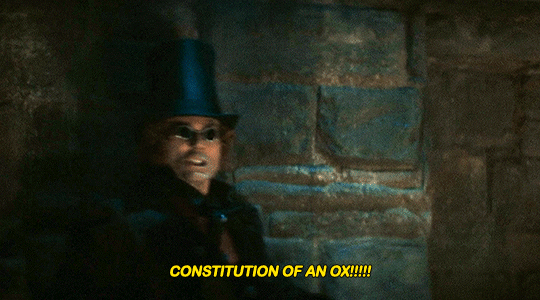
Not quite this, but I can find a gif for just about every other part of the scene except for the line I'm looking for. The one where after a bunch of hilarious noises, he says, "Do I sound like a goat?"
And then, a short while later...
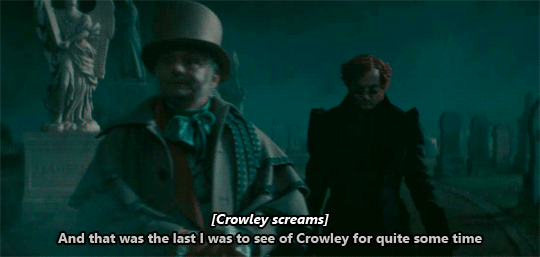
The ground opens up (a gate to Hell?), and Crowley disappears, pulled down to Hell. And then we get one continuous shot of Aziraphale turning around in that spot that starts in 1827 and ends in present day.
We still don't know exactly why Aziraphale went to the cemetery. Maybe "Goat Gate" is the clue that sent him there?
One final thing I noticed in that episode that feels a little off to me now - Crowley's reaction when Aziraphale calls and asks him if he remembers Mr. Dalrymple. "Oh yeah, not a doctor, a mister! Whatever happened to him?" It's surprisingly normal and relaxed, considering what happened at the end of the night, isn't it?
#sleep-deprived meta-ing#good omens#good omens 2#good omens meta#good omens clues#good omens analysis#good omens 1827#the resurrectionists#aziraphale#crowley
154 notes
·
View notes
Text
Sirius’s early maturity as a result of family views and traditions. Romantic and sexual behaviour
18+
First of all, I'd like to leave a link to this meta by @artemisia-black so I don't have to write the same things that are already covered. The part about boundaries is especially important.
Next, I'll add my perspective.
1. Most likely, Sirius couldn't be a playboy or casanova due to the social organisation of their society + his personal attitude towards boundaries of other people, including women, as described in the post above.
2. However, that doesn't say much about his sexuality and romantic behavior.
More likely JKR wanted to make him straight and prone to non-committed relationships, but canon itself says nothing about his sexuality and I think everyone can read him as they want. Honestly, I personally don't care who Sirius is sleeping with/not sleeping with in people’s HCs. I care about his personality, and his sexuality doesn't change anything about his canon characterisation, so I don't particularly see the point in arguing about his sexuality (straight/gay/bi/ace/whatever) with foam at the mouth. (And he is not queer coded.)
But there is some interesting things that I’d like to discuss.
1. First of all, why the playboy/casanova version seems the most untenable to me, besides what was written in the post above?
A bit about the school and society:
In my opinion, for the WW, it's quite illogical for a student to have a large number of sexual partners. Firstly, with whom? In some fanfics, Sirius finds a new partner almost every week and fucks someone every night. Where does he find so much time for casual sex at school/during the war and where do so many people wanting casual sex come from? No matter how handsome Sirius might be, not all girls and boys are willing to have casual sex. Most people want relationships, not casual sex.
So in my view, if in your headcanon Sirius never got out into the Muggle world of the 1970s, then he couldn't have had a large number of casual sexual partners at least in school, although the playboy reputation could have been there. To have that reputation, you don't need to do anything, just being charismatic and attractive. Reputation often precedes the person. Maybe that's why Remus said 'he always got the women'. They just paid attention to him. But if we consider the WW, especially the school, there's simply nowhere to get 'many partners' from.
2. Ignoring a girl as evidence of a certain sexuality.
The fact that Sirius ignored girls' glances at him doesn't say anything concrete. But it's often cited as an argument in favour of his homosexuality and/or asexuality.
But in reality, it can be interpreted in any way. As asexuality/homosexuality or simply as a demonstration that he really was attractive to many people, but Sirius himself, accustomed to such attention, no longer paid attention to the constant attention to him. When a person knows his attractiveness from his youth, he will not pay attention to every flirtation or every person who looks at him with lust. Often such attention can even be annoying.
Also, this character was probably well aware of his attractiveness and could see it in other people. The comments about Snape are very vivid. If appearance is not at all part of a person's values and they doesn’t pay attention to appearance, then a person is unlikely to insult someone based on their appearance - it’s usually a blind-spot. But attractive appearance, given by nature, are often seen as something that can't be taken away, it's always with you, and so the attitude is simple — if you can't wash your hair, fine, it's not that important. And knowing about his attractiveness and constantly receiving a lot of attention from other people – the value of this attention diminishes. A person just no longer pays attention to it.
That’s why he might have simply ignored the girl who was looking at him with interest (who had been studying with him and probably had been looking at him with interest for more than a day).
3. The age of consent. Early maturity. TW Underage.
The age of consent in the Muggle UK is 16 years old. And in the WW, people become adults earlier, at 17. However, Pollux became a father at 13. Cygnus became a father at 13. What was the age of consent? When did they get married? Was there even a concept of age of consent in the wizarding world? Perhaps their age of consent was 12 (given that in 1275, the first age of consent was set in England, at age 12 and only in 1875, the Offences Against the Person Act raised the age to 13 in Great Britain and Ireland, and the International Statute of Secrecy was signed in 1689, it's possible that wizards are still stuck with laws from that time). Or maybe Pollux and Cygnus got married later. For example, at 15 (17-2). Or maybe they have no concept of age of consent at all and there is no prohibition on marriage before reaching legal age, so they could get married whenever they wanted. Considering that marriages are magically contracted without the involvement of authorities, this option seems viable.
I'm not here to judge fictional characters, I'm discussing facts from the canon. There is every reason to believe that for some families in the WW, "maturity" came much earlier than it does for us now, and it wasn't nonsense. Rather, it was casual liaisons that were condemned as something that could cause unwanted pregnancies. But not marriage and sex itself before the age of 17.
Even in our time and in our society "an estimated 55% of teens have had sexual intercourse by age 18". These percentages have gradually declined since 1988 when 51 per cent of female and 60 per cent of male teens have ever had sex".
Your right to consider this something bad and refuse to write/speak about it, but it was, is, and always will be a part of teenage life, and judging by the Blacks, in the WW, the attitude towards this was quite... "old-fashioned", if it concerned marriage and childbearing.
I am inclined to believe that it was the Blacks who had this attitude towards early marriage and early childbirth, and therefore towards early sex, BUT not casual sex, because nobody wanted unwanted pregnancy.
And this could have influenced Sirius's attitude towards himself, his sexuality, and how mature he considered himself. Sorry, but when your grandfather became a father at 13, as did your uncle... well, you definitely look at growing up a little differently. He put up Muggle posters too because his parents were annoyed not by the fact that he was a 14-15 year old thinking about sex (although he might not have thought about it at all, he just knew it would piss his mum off), but by the fact that he was thinking about sex with mudbloods, which horrified his parents.
Just imagine what must be going through the mind of a 14-15 year old who decided to piss his parents off. What would James do? Well, paint the room red. Put dung bombs on the head of everyone who walked in. What did Sirius do? Erotic posters (women in swimming costumes are erotic posters to their world).
In my opinion, this says a lot about all the Blacks and the fact that they have some peculiarities in their family dynamics. Where did he even get the idea for this, if Sirius and the Blacks were innocent in their attitude towards teenage sex and growing up? I can totally see them yelling at him after these posters 'if you get someone pregnant, you'll really regret it!'.
The posters themselves don't say anything about Sirius's real intentions or his sexuality – he could have just put them up to piss her mother off, knowing that it would annoy her, or he himself might have liked them.
Meanwhile, James and his parents probably had a different dynamic, and they probably treated James as a child for much longer. So James matured sexually in his mind later. His parents probably didn't even talk about such things. And considering that they went to a conservative school, then further than kissing for him at 15 was probably not even a topic, if they even got to kissing.
Most likely, Sirius's 'early maturity' and all these posters are exactly the result of intra-family traditions and views.
4. It's confirmed by Word of God that he didn't have a girlfriend, but…
If we consider only the books as canon, then we don't know anything about his girlfriend/boyfriend, and he could have had some romantic relationships, because the canon itself doesn't say anything about it.
But I'll specifically analyze the case with 'Word of God':
Well, Sirius never had time to get a girlfriend, let alone marry.
Sirius was too busy being a big rebel to get married.
This means only one thing: he didn't give any commitments. That's it. It doesn't mean anything more than that. He could have had no partners at all, meaning he could have been focused only on friendship. Or he could have had a sexual partner (of any gender) without commitments. One or more. Who mutually wanted this. And these relationships didn't take up much of his time.
Non-committal relationships can be with sufficient respect for the partner. This doesn't make the character a Casanova/Playboy/fuckboy.
In the monoromantic concept of serious relationships, respect for the partner is often perceived only within the context of monoromantic relationships. But that’s not the only option. In non-committal relationships, there can also be a lot of respect for the other person's boundaries because the person isn't lying about their attitude (unwillingness to have a serious relationship), does not pile on false promises and usually does not confess eternal love. But playboys and casanovas can often lie to get someone into bed.
The view on purity and filth is very interesting, but in my opinion, purity for the Blacks is conceptually not the same purity as for the upper class in the Muggle world raised in a Christian reverent tradition. Purity is primarily 'noble blood.' To be pure is to be noble, and Sirius has his own understanding of nobility, not based on blood purity. For him, honor and nobility mean being loyal to friends, being honest, not betraying, and that's why he uses epithets of impurity for Peter. Peter lacks nobility.
As I said, having one/several partners without commitments doesn't automatically make the character a playboy and casanova – in other words, it's not about the Erot of perverted Aphrodite – people who love only the body, not the inner world (seeing people as objects, ignoring the person as a whole).
So, taking into account the Word of God, I actually see only two options.
He didn't have sexual relationships at all/tried it and didn't like it/ wasn't interested/ found it not very interesting or just was more focused on his friends and other things in his life.
Or the second option – he had non-committal relationships, which were always based on respect for the partner, but it was never like 'my girlfriend/boyfriend,' more like sexually-friendly relationships where he treated his partner not just as an object for sex but as a person.
The third option, if we discard the Word of God – he could have had regular monogamous romantic relationships of any nature with any gender, as there's nothing in the canon about his sexuality.
As I said, I don't think it fundamentally changes anything about his characterisation, so no matter what his sexuality is, he should retain his canon personality traits.
#sirius black#sirius black meta#hp meta#the noble and most ancient house of black#the marauders meta
88 notes
·
View notes
Text
Buddie 7x04 Meta Part 4 (of 4)
Click here for part 1, part 2, and part 3.
This is the last part so it probably won't be as long (hopefully).

This entire conversation with Tommy includes a lot of references to Eddie. Whether Eddie's mad, how Eddie feels, why Eddie would like Tommy, how Eddie/Chris feel about Buck, how Eddie is such a great person and everyone would want to be friends with him, etc. Even when they're not talking about Eddie, they're talking about Eddie. And I love the idea of Tommy and Eddie being friends. Because honestly at the end of the day, it was Buck who was projecting more than friendship onto Tommy and Eddie's relationship. Queer men can have platonic friends that they like without wanting to be with them, and it genuinely does seem like that's what Tommy and Eddie are to each other. Their chemistry wasn't all in Buck's head, but how the two of them together made Buck feel? That was so real and super super telling.
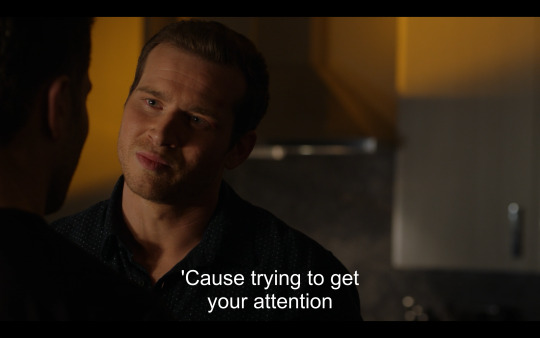
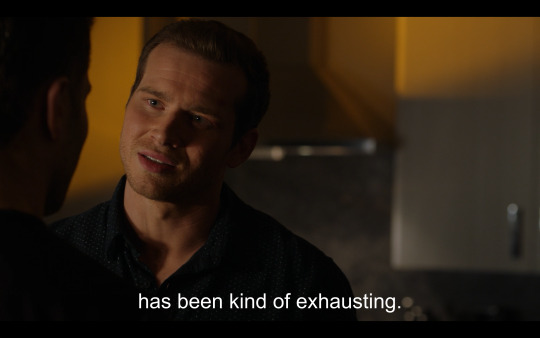
Here's callback number ∞ to the streetfighting arc. This line in particular borrows a very particular...word...from a very particular grocery store fight. In 3x05, Eddie is the maddest he's ever been at Buck because Buck starting the lawsuit meant "I couldn't even talk to you", "Do you know how much Christopher misses you? How could you you weren't around?", "because you're exhausting!" Exhausting has been a buzzword in the Buddie fandom for many years and most people use it as an excuse for overdone and unnecessary Buck whump, but it's an interesting choice here. Especially in conjunction with Buck's acknowledgment of "making everything about him" which is another thing that is mentioned in the same episode 3x05 AS WELL AS in 3x09. But now, it's being used in a different context. Buck is falsely ascribing all of his attempts to get Eddie's attention over the last however many days to trying to get Tommy's attention. Even Tommy's like huh? "My attention?"
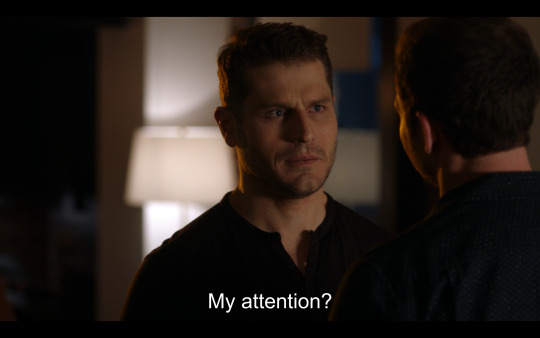
Lou places emphasis on "my". "My attention?" So even Tommy knows that this whole time Buck has been trying to get Eddie's attention. He's surprised that Buck is suddenly saying it's been about Tommy the whole time when quite obviously, it has not been.
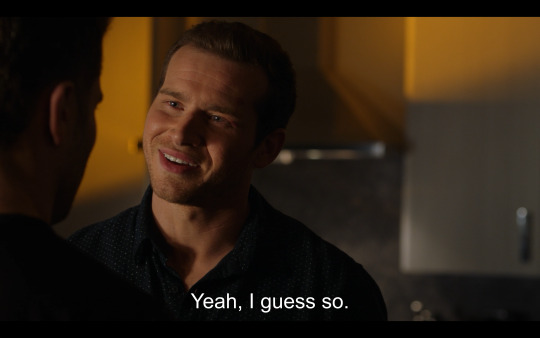
Even Buck himself is not so certain about that. He "guesses so" because in this moment he's feeling infatuation, a connection with Tommy, a warm feeling that maybe reminds him of how he felt in the early days getting to know Eddie. He "guesses so" because that's the easy explanation to a question that's been circling his mind non-stop the past few days. It's an answer, and as we know Buck is always seeking an answer. It's a "for now readily available easy explanation" that Buck can take at face value because it means he can sleep easy at night knowing that his place with Eddie is safe again for the time being.
Even just a couple of seconds before the kiss happens, Buck brings up Eddie one last time in case you forget who's always on Buck's mind. He then mentions Maddie's words "There are better ways to get someone's attention", before he's interrupted. But before I dive into the kiss, I want to mention the implications that Tommy believes the best way to get someone's attention when you like them, instead of getting jealous, is to kiss them. It's an interesting suggestion, that all of this time, instead of all Buck's stupid peacocking attempts to try and get Eddie's attention this episode...he could've just kissed him. Foreshadowing? Only time will tell.

And boom. There we have it folks. Tommy kisses Buck, and the lightbulb goes off. Buck is attracted to men, he likes men AND women. This is 911's definitive statement that yes, we were right, Buck is bisexual, has been this whole time, and will always be in the future. And no, it's not just in relation to Eddie (which by the way is an IMPORTANT distinction). Buck is attracted to men in general, he's a bisexual man, and the show is not doing a "gay for you" trope here. They're committing to Buck being a queer man and this opens a world of new doors for him.

And again, I've said it once and I'll say it again: finally letting Buck realize his bisexuality, and act on it ON SCREEN (not just a throw-away mention) is REVOLUTIONARY. This representation is incredibly important and Buck's bisexuality on its own, separate from any love interest, will always be a part of him. Whether you like Tommy or not, that's not what matters. What matters is that Buck is realizing he can find happiness with a man. And more than likely, he will end up with a man, not because he has to, but because his perfect partner in the show has already been proven to be a man.
Eddie Diaz.
With this kiss, we are officially on the path towards Buddie. Buck kissing Tommy, or having a temporary relationship with him does not negate that. Just like Buck was always going to end up with Eddie even through his relationships with Abby, Ali, Taylor, and Natalia. Tommy is no different. And if after four long essays explaining point by point why that is true isn't enough to open your eyes, then I simply can't help you anymore.
Some last tidbits:
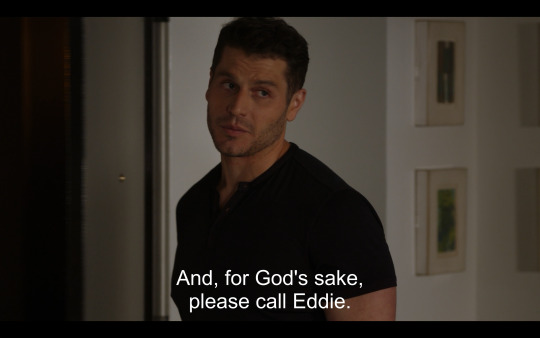
This reminded me of the Lonestar crossover where Eddie begs Marjan to "for the love of God, please follow Buck back on Insta." Just interesting since Eddie x Marjan was another fake-out love interest coupling.

And finally, the last 3x09 callback. This reminded me of the line when Buck says Eddie wanted to throw punches at him, Eddie says "I wouldn't do that", gives him a seductive look, and then says "You're on blood thinners". To which Buck says his famous "I could still take you". Yet another verbal comparison of Tommy to Eddie.
Final thoughts: This episode was fucking amazing (I really liked Athena's story too). This episode was more than enough proof for me that Buck and Eddie are going to get together. Buck is bisexual and FREE!!!!!!!
We were right about that, we're gonna be right about Eddie, and we're gonna be right about Buddie. Just unclench and enjoy the ride.
And for my fellow warriors who've been in the trenches for years telling everyone that the story will get there eventually, I salute us all! I hope yesterday's episode was vindication for you all as much as it was for me. I had a blast working with you all. See you all again for our celebrations when Eddie comes out and Buddie becomes canon. For now, I hope everyone had a Happy Bi Buck day!!

Full meta: Part 1, Part 2, Part 3
#911 abc#buddie#buddie meta#911 meta#911 speculation#bucktommy#buddie speculation#buck x eddie#evan buckley x eddie diaz#this took me literally an entire work shift (8 hours)
75 notes
·
View notes
Note
hmm this may interest you, do you have thoughts on this subject matter character-wise or in a meta sense?:
https://www.tumblr.com/thecruellestmonth/740875315694501888/batman-turning-points-3-batman-under-the-red
personally i'm not a fan of bruce's disavowal of fatherhood much for the same reasons that i'm not a fan of his installing the good soldier plaque. these to me are both writing choices driven more by writers' desire to explore theoretical concepts than they are driven by a character study of bruce himself. the concept of robin as an occupation inherently equivalent to child abuse is interesting. the concept of wondering what right a father has to children he has adopted towards that end is interesting. that being said, exploring the former concept didn't necessarily demand eliminating robin altogether. exploring the latter concept didn't necessarily demand bruce completely disavowing himself of any accountability. and ultimately both writing choices ignore that a core aspect of bruce's relationships with the robins was wanting to be a good parent, or at the least a good guardian. certainly something more than a mere ally or friend. he took responsibility for these children because he wanted to help guide them towards a certain path in life where they would no longer be ruled by their trauma the way he was and is by his. allowing them to become robin to that end was obv more than questionable, but all too many writers forget and even go so far as to ignore that bruce knew that. he was well aware of his status as an enabler and he eventually hated himself for it deeply. he felt perpetually guilty and reluctant to ask dick for any support once the latter became an adult bc he didn't want to sanction and (in his mind) effectively require dick to do something that would endanger his life on his own orders. he could realistically never stop dick from pursuing vigilantism, but he could at least refuse to ask dick for that commitment any longer so that dick had complete freedom to make his own choices as to the matter. regardless, bruce had to live with the guilt of having enabled the existence of robin to begin with, and he intended to live with that guilt. it was his closest friend and his primary means of survival
if anything, that to me is precisely why his disavowal of fatherhood doesn't make sense. bruce is a poor communicator and he has a tendency to take upon all burdens at the expense of his loved ones feeling like he no longer values them or their support, but that doesn't negate the fact that he's quite hyperaware of his flaws. he's a far more relentless critic of himself than he is of others, and that stems as much from self-righteousness as it does guilt. he's supposed to be better. he's supposed to set an example. he's supposed to do the right thing. he's supposed to save the whole city even if he's only one person. and so on and so forth. bruce is possessive of highly unrealistic expectations for himself bc he's a ridiculously emotional person trying to tell himself to act like a robot. he repeatedly sets himself up for failure and then when he inevitably fails he kicks himself down like a dog. he is essentially a walking man-child simply because he cares too much and that often leads him to make stupid, emotionally driven choices: like taking random children into his home and teaching them how to channel their emotions through fighting crime, because if it worked for him it might work for them too, esp when they've got the added benefit of his supervision and well-intended (albeit awkward) companionship
all of bruce's circumstances and internalizations and traumas point to him taking what i would term excessive ownership of his crimes. he's a self-made pity puddle because he thinks everything is his fault. dick barely having a life outside of vigilantism is his fault. dick nearly falling to his death is his fault. jason failing to properly process his parental trauma is his fault. jason getting blown up by the joker is his fault. i simply cannot imagine a world where bruce isolates himself from caring or from taking the blame because doing the latter has been his modus operandi for so long. it makes more sense for bruce to disavow fatherhood in the specific context of not wanting to take the place that john and mary or willis and catherine will always occupy; it makes less sense for bruce to disavow fatherhood in the specific context of raising and loving dick and jason as if they were his own. it's very much a you don't have to call me dad but when i call you "chum" i mean "son" situation. he's never one to burden others intentionally (although we obv know this rarely plays out the way he wants it to), rather he intentionally burdens himself. that's precisely what knightfall as an arc is stellar at depicting, regardless of the fact that it coincides with the existence of the good soldier plaque. bruce in the aftermath of jason's death has to blame himself excessively because it's the only way he knows how to cope. i've never understood depictions of his grief with an emphasis on jason's share of the blame bc not only is it classist towards jason, it's also inconsistent with bruce's own character and tendency to believe that every bad thing that happens is his fault. it's why i'm not really a fan of gotham knights #43-45. a death in the family makes it clear that bruce blames himself for not allowing jason to have the space and time to process his trauma properly before throwing him into the suit. allowing him to have hope never even comes into the picture
and i'm not sure if anyone has ever considered this, but the disavowal of fatherhood really confuses me when you remember tim exists. why is bruce's disavowal with regards to jason even necessary when the crux of tim's entry into the mythos is precisely the fact that he isn't someone over whom bruce can similarly exercise responsibility and ownership.. it's far more interesting to explore the tightrope bruce walks with that partnership because he's easily in a place to deny responsibility and yet obv he ultimately can't because despite whatever reluctance he expressed initially, he eventually gave in. the tone of the grant/brefoygle run also helps with depicting that dilemma. we're not primarily privy to the bruce of old anymore, who while quiet and awkward nonetheless expressed a capacity for caretaking. there are remnants of that of course (esp after tim's mother dies). but the bruce of the 90s is more imperious and domineering because he's been hardened by trauma. he delivers grand speeches about vigilantism and justice. he sends tim across the pond because he needs proper training. the fact that they're neighbors and get burgers together sometimes doesn't detract from the physical divide present there because tim is ultimately someone else's son and possessive of a life entirely divorced of what he does in the mask. he can walk away without preamble in a way that dick (at least until adulthood) and jason never could. plenty of writers recognized that and personally i believe it's what made the 90s robin run interesting to read, but i also believe writers retroactively projected the necessity of an emotionally distant bruce to that narrative onto the bruce of old. it was progressively rewritten to be a constant rather than a development in the wake of a highly transgressive event. and unfortunately that's tainted every interaction and/or recollection that he has with/of jason afterward
#anyway. idek if this makes sense or feels coherent anymore i'm sorry :/ but the recording was definitely worse#and i also said some things on it that i don't actually think i believe. so#this was definitely a better means through which to organize my thoughts. however well i could#outbox
56 notes
·
View notes
Text
Merry Schnees-Mas!
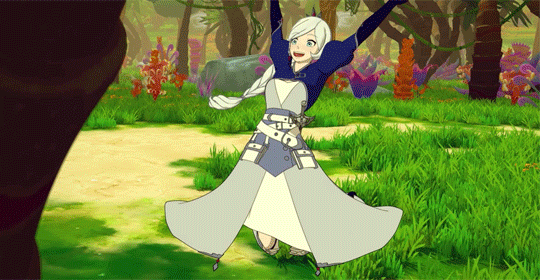
It's Christmas, so here comes a short meta on the Schnees' secondary allusion, which is rooted in the founder of the SDC: Nicholas Schnee.
NICHOLAS AS SANTA CLAUS

Nicholas alludes to Santa Claus:
He is called "Old Nick"
He has a white beard and wears a red cape with white fur
He lives in the Kingdom of Winter and is the Head of the Schnee (snow) family
He is famous for being fair and generous
He is the founder of a company who produces the equivalent of magic (Dust) and is known all around the world
Under his leadership the SDC is small, but famous for its quality, fairness and genuine values.
JACQUES AS A GOBLIN-JACK FROST

Jacques alludes to Jack Frost:
His name Jacques is similar to Jack and his surname Gelè means frost in French
He is associated with cold, as he makes his family's life cold and lonely through his abuse
Jack Frost is often depicted positively and is even considered Santa Claus's helper. For example, he makes snow fall, so that Santa can camouflage himself in the sky. Obviously, Jacques is an inversion, as he tricks Willow and Nicholas in trusting him with the SDC. In short, he is a false friend to them: he acts as the embodyment of winter, only to reveal himself as a cruel goblin. Like the one who builds the evil mirror in The Snow Queen. Or like Santa Claus's most famous enemies.
Under him, the Company grows and starts exporting in the whole world. Still, the workers are exploited and more and more unethical methods are used. The SDC and the Schnee Family both lose their identity.
THE TRUE MEANING OF CHRISTMAS

Let's review:
Nicholas founds a company built on mutual help, fairness and quality
Jacques comes and makes it bigger and more successful, but sacrifices its people for it
Doesn't it sound similar to what capitalism does to Santa Claus and Christmas itself?

Then the point may very well be that the Schnee Family needs to rediscover the "true meaning of Christmas" and Nicholas's original ideals.
Luckily, a certain snowflake is on it:
Weiss: I don’t know who you think you are, but let me tell you who I am: I am the granddaughter of a hero and a child of a villain. I am a citizen of a fallen Kingdom and an heir to nothing. I will not be defined by my name because I will be the one to define it. I am Weiss Schnee, and I am a Huntress!
Weiss is bound to rebuild the Schnee Family legacy and to define what her surname stands for.
Interestingly, our Snowhite is also tied to resurrection (as per her fairy tale) and to religious symbolism:

And what is Christmas, if not the celebration of Jesus's birthday? The child who will die and be reborn to save humanity?
I would say our Snow Angel's chances to succeed are pretty high!
Merry Christmas to whoever celebrates! And Happy Holidays to everybody!
#rwby#rwby meta#once upon an allusion#schnee family#weiss schnee#nicholas schnee#jacques schnee#santa's granddaughter#my meta#merry christmas!#greenlight volume 10
61 notes
·
View notes
Note
Whenever you can I'd really like to hear your thoughts about this and if you think it's accurate! ❤️ I absolutely adore your hxh meta and can't wait to hear more!!!

Hello! Thank you so much for the kind words, it means a lot to me! ❤️ These are fantastic observations and questions, as these traits are an important part of the basis of Gon's issues, and this tendency of his to rush into danger leads him into a lot of dark situations throughout the series. It's one of the most concerning aspects of his character.
His self-esteem issues are definitely at the root of this. Gon seems to have a fundamental belief that his life isn't worth much--hence why he tells Killua he's allowed to talk about dying, but Killua isn't. I think a big piece of this comes from the abandonment issues, as well as his issues with guilt (which I still need to write a post about). If even his own father won't stick around for him, what is he worth? And notice he frames Ging's choice in such a way where he doesn't assign blame to Ging--he believes that in a choice between him and being a Hunter, he must just be the inferior choice. Not a great basis for self-worth.
As much as he looks up to Kite, I don't think his encounter with Kite when he was younger helped--he was blamed directly for the mama foxbear's death and Kon becoming an orphan. And while I don't doubt at all that Mito loves him, I think Gon may see himself as a burden on her to a certain degree, and he tries to be as self-sufficient as possible as a result. (That's more of a headcanon of mine, but I do think the complex way their relationship is framed and Gon's behavior in the series supports this to a degree.)
Because he doesn't see his life as being worth much, he tries to take on everything alone, and he sees strength and power as a method to prove that he does have worth after all. If he can prove he's strong, maybe he isn't worthless after all! If he's strong, maybe he won't be a burden to others or unintentionally cause them harm (think about the mama foxbear, and ultimately Kite himself)! If he can become a Hunter and find Ging, maybe he can understand why Ging didn't stay with him, and he won't have to wonder why he left him behind any more!
I definitely think dangerous situations and escaping death give him a a sense that he is capable and worthy, plus it's a rush to him--a form of excitement and stimulation that he craves. Also, keep in mind that Gon grew up among nature, including many wild animals. While "survival of the fittest" is an oversimplification of how nature works, certainly at the same time, a weak animal is more likely to fall prey to a predator. So of course being strong is the more advantageous position to be in, and especially as a person who isn't sure of his worth or his place in the world.
I think he believes the stronger he becomes, the more dangerous situations he can escape, and the more strong enemies he can defeat, the more capable and worthy he'll feel. Because of how much his self-esteem then hinges on whether he's strong or not, things like Hisoka punching him and giving him his badge make Gon struggle to feel like he has value. The times we see Gon cry, like in his conversation with Kurapika in the airship about that moment with Hisoka, or in the scene after he couldn't win against Knuckle and couldn't go to NGL to rescue Kite, often relate directly to him not feeling strong enough.
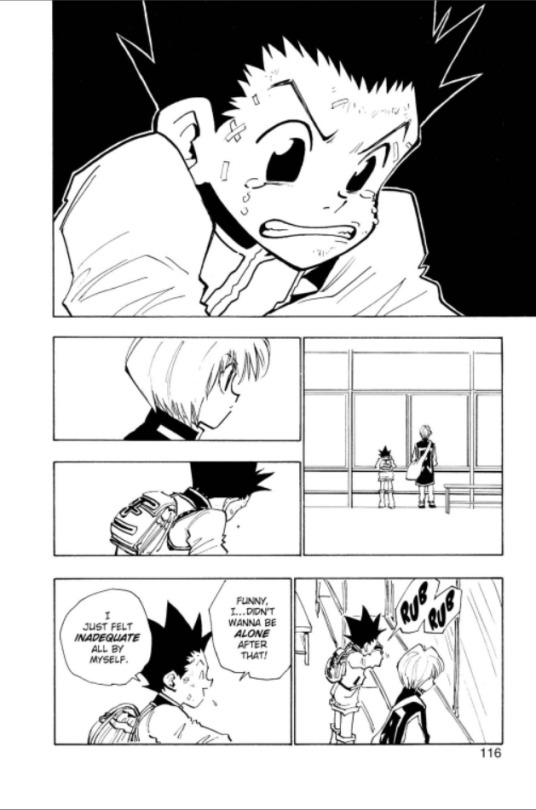
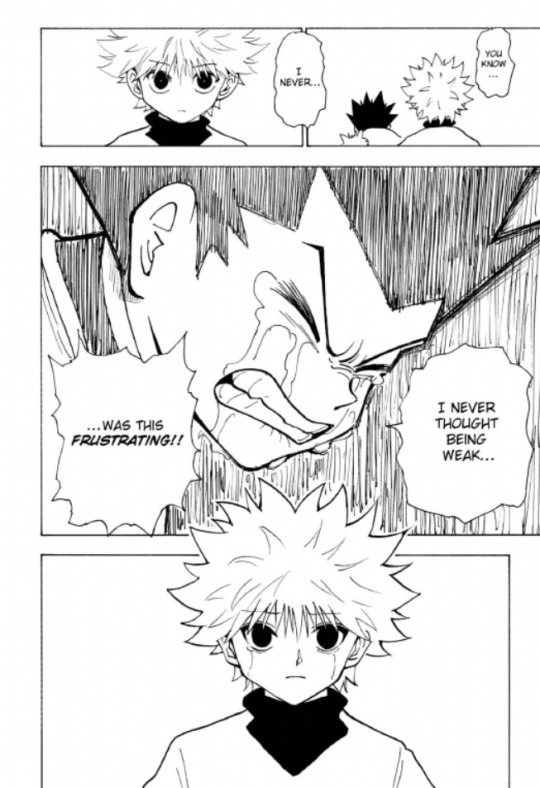
Also yet again (back to my usual refrain), this is in fact another subversion of shounen expectations. Shounen protagonists tend to be energetic and feisty teen boys who throw themselves into dangerous situations easily, and in most shounen series this is a trait that's not treated with much weight--they can handle it, nothing truly bad generally happens to them as a result, this trait of theirs is treated as something brave and admirable and "cool."
But with Gon, Togashi does give it weight--others worry about him and comment on this trait of his, his recklessness has real costs for him that escalate over time (think about the results of Gon tailing Hisoka in the Hunter Exam, Gon vs Gido, the end of Greed Island, and of course CAA), and ultimately his disregard for his own worth and safety essentially leads him to throw away his own life. In Gon, it's not an admirable trait, but a concerning and tragic one, with deep roots in his psyche.
It's brilliant to me how many of Gon's traits all link together--his low self-esteem comes from his abandonment issues and leads to his recklessness, he has a selfish streak because he's young and still somewhat immature and grew up isolated, and his short-sightedness as a result of that manifests in his sense of morality not being fully developed. And yet even with all of that, he's still a sweet, cheerful, kind, smart, and encouraging boy. I absolutely love the complexity of his character and how, if you carefully analyze him, the way he is makes so much sense.
Thank you for asking!
62 notes
·
View notes
Text
The Case for Toshinori Yagi Living and What (Could) Happen Next
Now that MHA 386 is officially out in English as of 4/23/23, @aoimikans and I can talk about our discussions and theories of what comes next. This is mainly an argument for (and reassurance of) Toshinori Yagi living through the coming fight with All for One with evidence from the series—as well as some related theories and predictions.
Buckle in, because this is a long one.
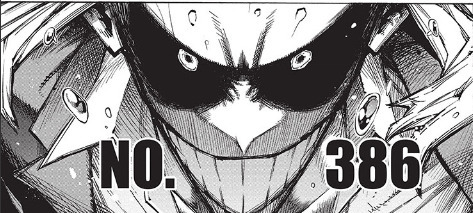
An outline for the sake of having an abbreviated list of what we intend to cover:
The Case for Toshinori Yagi living through this fight and why.
Toshinori’s character arc
- What we know, and how it has been presented
- A Callback to a Previous Meta: “Narrative as an Active Force [...] True Heroic Ideals” / Toshinori’s Heroic Spirit
Shigaraki vs. Izuku
- The One for All Mindscape
- Bakugou completes the whole. Save to Win. Win to Save.
Toshinori’s last fight and its nature
- Won’t cost him his life, but may cost him a limb.
The proximity of Hero Killer: Stain
- Also, does he have the Green Goblin hover glider?
The Question Posed: Can a Quirkless Person Be a Hero?
- The difference between "Hero wa dekimasu ka?" and "Kimi wa hero ni nareru."
Nighteye’s Vision and Twisting Fate
- How it’s worked before
Citizens of MHA
- How they could help
All for One’s Hatred and Self-Inflicted Demise
- He isn’t the same AfO
Quirks: What we know, and how we know it
- What are Quirks
- To be Quirkless
- To have multiple Quirks
How All for One could screw himself over in the end
- It’s too late for him
Whereas Toshinori has decided to live…
What we know: Toshinori grew up as a Quirkless young man living in a state of terror with a strong drive to do something to change the world and make it better. His mentor, Nana Shimura, was like a mother to him and passed the power of One for All to him. She was killed, and Toshinori was forced to flee until he was strong enough to take down AfO’s empire. He returned and in his first fight with AfO he believed he killed him. He was injured to the point his sidekick Sir Nighteye suggested retirement and revealed a vision of a terrible death at the hands of a villain. Toshinori refused to retire, but he became disheartened even while he continued his work as a hero with a shortening time/endurance limit. Then he was inspired after meeting Izuku. Izuku changed his outlook, particularly during and after the Kamino fight.
How it has been presented: Perhaps some of the most defining moments of Toshinori’s character arc are scenes in which he declares his desire and determination to live despite the hardships of his post-Kamino existence. Let’s take a look at some:



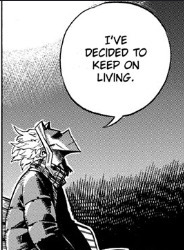
It has not been an easy road for Toshinori. After making the above declarations, his self-worth took a major blow when he fell behind, unable to keep up and support Izuku in the way he felt he needed to. But then, he was given an intervention from some unexpected sources—Hero Killer Stain and the last person All Might saved—who gave him back his will to live, and he reaffirmed his drive to live and support his students.

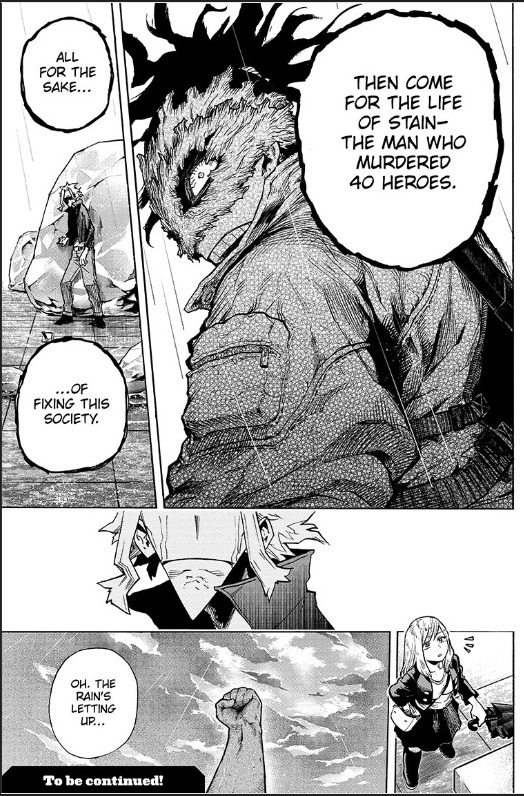
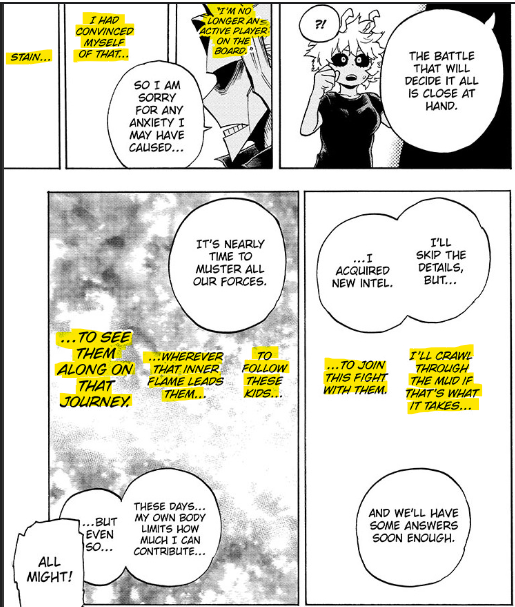

Toshinori’s character development—particularly post-Kamino—has been all about being Toshinori Yagi and having a life after losing his ability to be All Might. Toshinori Yagi is flawed, not the physical powerhouse he was as All Might, but he has worth and the desire to live as himself.
Toshinori lives and his character arc and development all mean something. The mentor-dies trope died with Nana Shimura in the last generation of heroes. Sir Nighteye’s vision of a certain, terrible future died with him (see the Nighteye section below for an expansion on this). Toshinori’s character shows a life after being a career hero, being a Pillar of society, and being a Symbol of Peace. He didn’t lose his value when he used up the last of One for All. Toshinori has inherent value and should be allowed to live out the rest of his natural life.
Toshinori dies… and then what? What was the point of his declarations? What was the point of his development and overcoming hardships? These were personal victories witnessed by very few people in private moments. Just from a story-writing perspective, his death would be so incredibly unsatisfying. And if he dies, what happens with AfO? Does he just move on to the next fight? No, death doesn’t make sense here.
I once wrote a meta post titled “Narrative as an Active Force and Izuku as an Embodiment of Heroic Ideals”. In the post, I briefly discussed how those that left the path of a True Hero typically faced suffering punishment (usually an injury or an encounter with Stain). In the case of Toshinori, his first fight with All for One resulted in his injury because he fought—if only for that final blow—for revenge for Nana Shimura. AfO taunted him, insulted Nana Shimura, and All Might “killed” him.
Toshinori’s choice to go and face All for One for a third time without a Quirk was an act of bravery, sacrifice, and True Heroic Ideals. This alone would, in a way, atone for his previous actions of fighting with wrath and intent to kill.
This altruism—not a Quirk, not power, not fame—is what makes him a hero.
Whereas Shigaraki is Izuku’s foil and foe, not All Might’s…
Just as Toshinori told Naomasa Tsukauchi that he was always meant to fight All for One (and told Todoroki to return to face Touya/Dabi), Izuku is meant to fight Shigaraki. It is also important to note that Naomasa was also present when Gran Torino told Toshinori that he could never fight Shigaraki because he would not be able to see him as a villain, but as Nana Shimura’s grandson.
Each party is pairing off to face the foe they are meant to face.

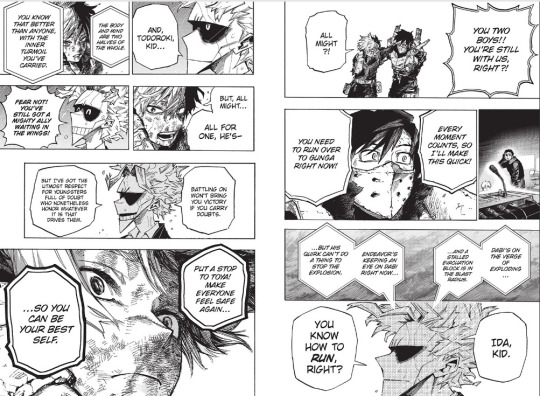

Toshinori lives and faces All for One, helping take down the villain whose evil acts formed Toshinori’s youth and career. He is the best suited in this moment to tie that loose end.
Toshinori dies… and then what? He would join the other vestiges of One for All holders past. But what good would that do? Flame Vestige Toshi already receives input from Toshinori with him still living.

Flame Vestige Toshinori (Aura Might) has access to all of Toshinori’s memories. He is Toshinori Yagi within the vestige mindscape, one and the same, wholly Toshinori while being separate from the living body of Toshinori. Toshinori is already there. They are one and the same. And Flame Vestige Toshi can communicate with the other vestiges, so if there was something critical that Izuku needed to hear, the vestiges could pass that message along.
If anything, if Toshinori died and became a clearer image in the vestige mindscape, it would be a major distraction and an unspeakably devastating loss for Izuku—who, may I remind you, is fighting after seeing Bakugou pretty visibly dead-looking and losing control of his emotions immediately. Even ignoring that, what would Toshinori be able to add to Izuku’s knowledge or power that his Flame Vestige or the other vestiges haven’t already? What could he add to Izuku’s knowledge that he hasn’t already taught him in person? Nothing really. So! With that said, there would be no point in having Toshinori enter the One for All Mindscape.
Shigaraki is Izuku’s foil, his foe. From the beginning of the story, Izuku has been pitted against Shigaraki who is the final Big Bad. Izuku has also shared his desire to somehow reach and save the child—Tenko Shimura—that is trapped within the twisted person of Shigaraki-AfO.
This is his fight… but not his alone.
Save to Win. Win to Save. Izuku is one half. Bakugou completes the whole. Ultimately, the final fight—if we are to trust how things are foreshadowed so far—will be Shigaraki vs. Izuku and Bakugou.
Not only that, but they may finally do what is necessary to be whole themselves. Bakugou may Save to Win (i.e. he may save Izuku when things seem dire and turn the tide of the fight). Izuku may Win to Save (i.e. defeating this Shigaraki-AfO hybrid to save Tenko and everyone he knows).
Toshinori has already told them they could be great heroes together. This is their fight to prove it, together.
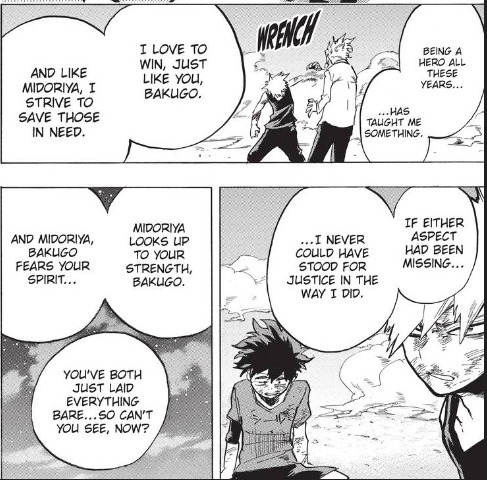
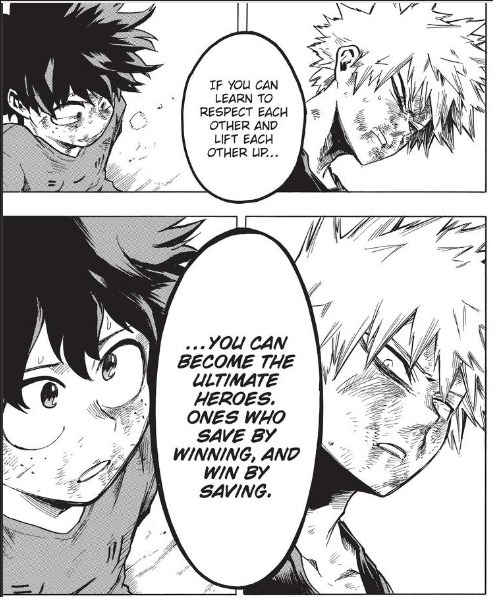
Whereas Toshinori doesn’t need to defeat All for One, he just has to stall…
We understand All for One is on a time limit. He is rapidly regressing/de-aging and will likely disappear given enough time. We also know that as he regresses, All for One’s emotions and mental focus are slipping out of his careful control. He was in a hurry to get to Shigaraki so that Shigaraki could take in the main body Quirk and All for One would then be able to live on and take complete control of the Shigaraki-AfO hybrid.
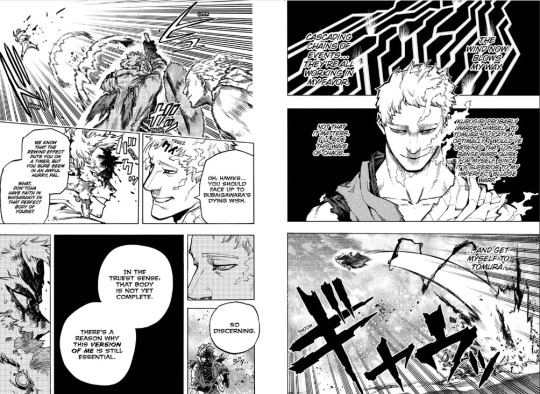
Toshinori understands the absolute need to keep All for One from reaching Shigaraki (and also Izuku). Toshinori understands no power thus far has kept All for One from going where he likes. And even those in the control room attempting to coordinate the fighting and the evacuation of civilians understand that there is no one else who could stop All for One.
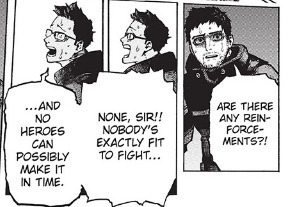
Importantly, Toshinori understands All for One’s obsessive hatred for him. No powers necessary, Toshinori was able to stop All for One in his tracks by just being there. Toshinori’s presence alone was enough. The rest is stalling AfO until his time runs out.
Also, this fight is taking place at Kamino. Toshinori Yagi’s place of origin, the starting point of Toshinori post-All Might. You don’t fight there again, with that significant backstory, and lose. (I swear, I will cry if the chapter is Toshinori Yagi: Origin or Toshinori Yagi: Rising.)
This Toshinori is the fulfillment of him being himself. He is the “mighty ally” waiting to stop All for One. This man who has struggled with self-worth and the will to live post-Kamino, he calls himself mighty! Quirkless Toshinori faces the greatest threat of generations with a fierce grin and the confidence of one who will put his whole back into this fight. He will win—and AfO will lose—because he must.

Aoimikans and my “Cost an Arm” Theory: Even though we believe Toshinori will not die and ultimately AfO will lose… we don’t necessarily think this will be a clean fight. Sir Nighteye predicted a terrible death, so what might he have seen leading up to it? Loss of limb, perhaps.
Toshinori will be in some kind of mech armor that AfO will probably need to—maybe after some badass fighting—tear apart. We’re fairly certain that given Horikoshi’s track record of heroes getting pretty gnarly bodily injuries, AfO is going to take one (or part) of Toshinori’s arms in the fight to get back at him for all the punching and smashing All Might did.
That and we know that information from Toshinori’s body/mind is fed into the vestige mindscape already via Flame Vestige Toshi. Perhaps Toshinori will lose the arm, the arm appears from the flame of Toshi’s vestige, distracting Izuku enough for a negative turn in the battle, which then leads to an opening for Bakugou’s reentry into the fight to turn it for the better. Drama! Suspense! Weeks between chapters with tense uncertainty!
Also, Horikoshi has a love of Star Wars and getting a limb cut off is just in vogue.
But don’t worry! If this does happen, Toshi will probably get a badass prosthetic like other similarly injured characters.
Also… just think of all the Hurt/Comfort fan-fiction that could stem from this… the possibilities…
Whereas Hero Killer: Stain is nearby and has a death wish…
In the same vein as the “Cost an Arm” Theory, a prolonged fight with All for One, regardless of how cool the mech armor is, will likely lead to Toshinori injured and appear to be at risk of a death blow. (There must be distress for the positive turn of the battle to be an amazing relief.)
Enter, Hero Killer: Stain who has been shown to be in an area resembling Kamino where Toshinori will be fighting.
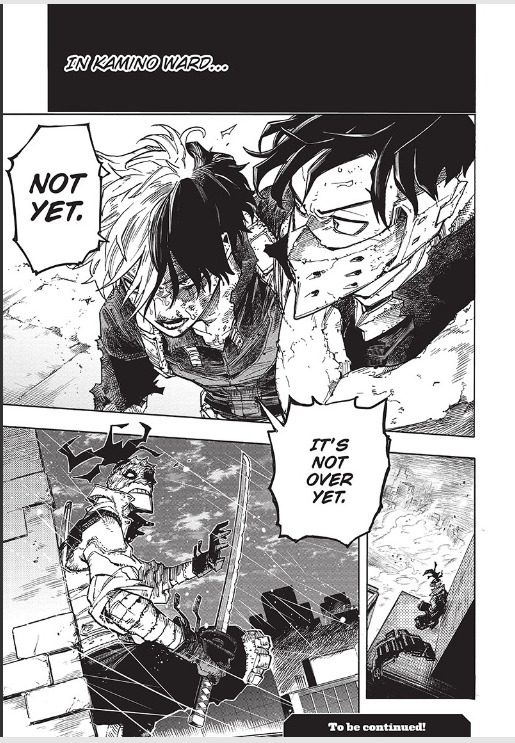
(Is that the Green Goblin flying thing Stain has?)
Stain can do two things that could alter the direction of the fight:
One, Stain’s Quirk only needs a single drop of blood to temporarily paralyze All for One, giving them much needed time to stall.
Two, Stain could very well take a death blow in Toshinori’s place. Stain has repeatedly said that All Might is the only one who is allowed to kill him… but he may just have to settle for dying for All Might instead. Given how Stain is the way he is, it isn’t difficult to imagine this playing out.
Whereas Toshinori revisits Izuku’s question from the very beginning…
In MHA 386, Toshinori remembers Izuku’s question from the very start of the series.
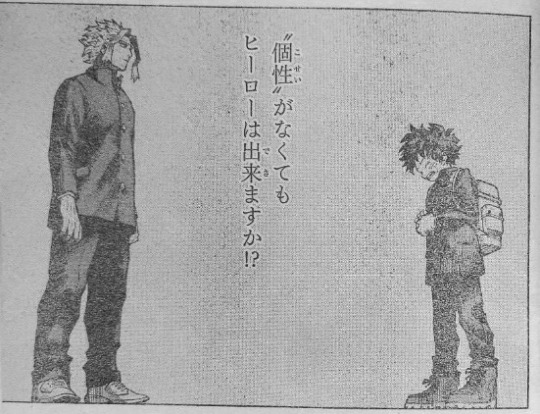
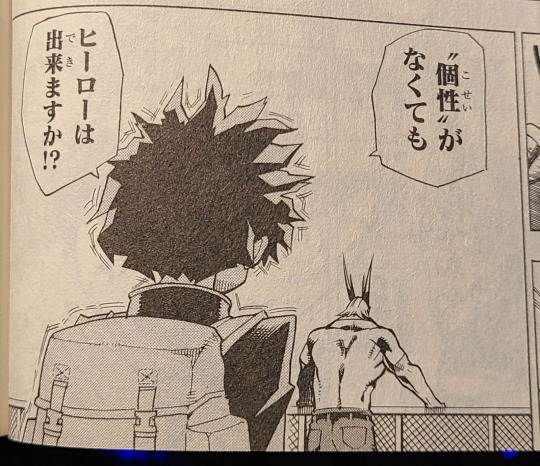

Izuku at the start asks "個���がなくてもヒーローは出来ますか!?" "Kosei ga nakutemo hero wa dekimasu ka!?” “Even without a Quirk, can [I/someone without a quirk] be a hero?”
When Toshinori answered this question and offered Izuku the chance to earn One for All, he said “君はヒーローになれる" "Kimi wa hero ni nareru." “You can become a hero.”
Aoimikans pointed this out to me when reading the Japanese version. There is a difference in what both Izuku and Toshinori are saying. “Can be” is different from “become.”
Izuku was asking: Can a Quirkless person be a hero?
Toshinori’s original answer was essentially: No, but you can become a hero if you have this Quirk.
This is so, so very significant in the context of Toshinori’s final fight and thematically for the story as a whole. He is about to give Izuku the answer he was originally looking for: “Yes. Yes, you can be Quirkless and a hero.” Toshinori is personally trying to prove to Izuku that Quirkless people can be heroes.
Izuku was Quirkless, and was a hero from the moment his body moved on its own in chapter one. Toshinori is Quirkless now, and he is a hero.
What does that mean in the overarching world of MHA? If a Quirkless person can be a hero in a world where Quirks exist, anyone can be a hero. More on this in a bit…
Whereas Nighteye’s vision of a certain terrible death died with him and Izuku isn’t the only one who can twist fate…
In trying to get Toshinori to retire early after his first fight with AfO, Sir Nighteye blurted out that he had looked into Toshinori’s future and saw his terrible death at the hands of a villain. Toshinori and Nighteye both were convinced that what Nighteye sees is the hard truth—once it is seen, it is set in stone.
This idea is thoroughly challenged when Nighteye foresees his own and Izuku’s death during the fight with Overhaul, and yet Izuku does not die. Nighteye says that it may be possible that the will—the thoughts and beliefs—of so many people altered fate.
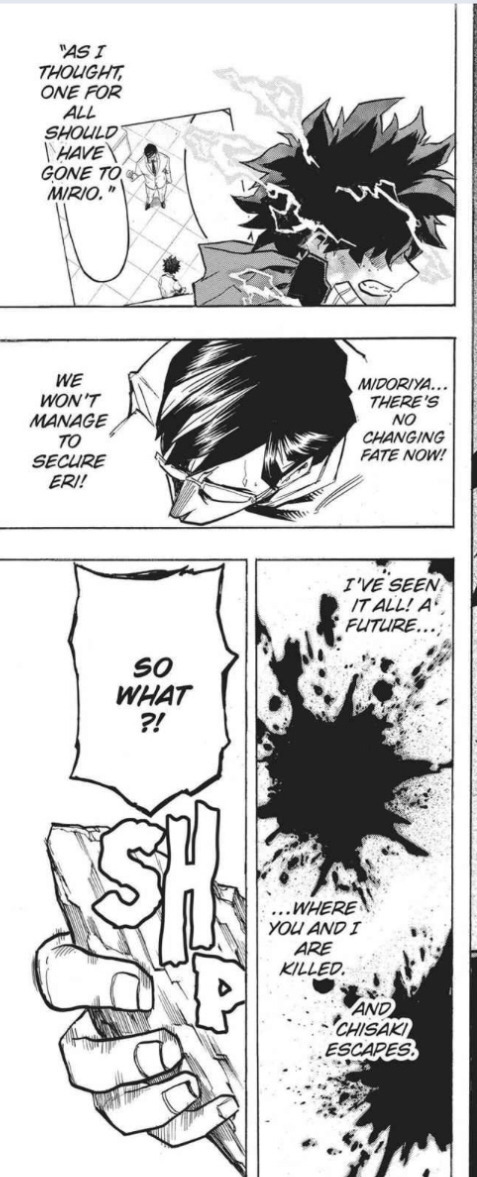
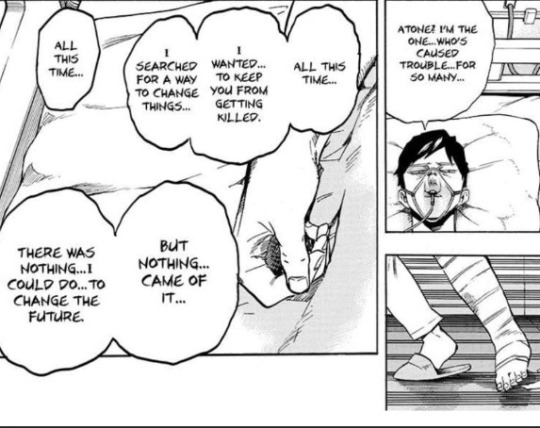

Nighteye’s vision of Izuku’s death was proved wrong, and in dying Nighteye took with him the certainty of his visions (and the ability to double check for a certain changed future). So, Toshinori’s own predicted terrible fate is not so certain anymore.
It’s important to note that Izuku doesn’t have to be the focal point of this bending of fate. It just takes the will of many people. Which leads to a possible prediction…
Whereas civilians did not all go underground to evacuate…
While there has been a good amount of focus given the civilians that took refuge with the help of U.A. and are currently in moving sections to evacuate the area, not everyone chose to follow that lead. Some have been seen to have hunkered down elsewhere in attempts to protect themselves. Not to mention all the civilians Izuku encountered during the Dark Deku arc.
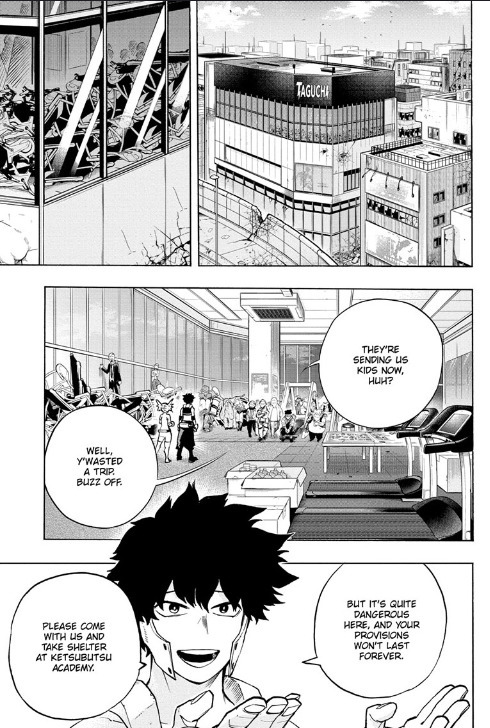

There is the possibility that those civilians may get the message that or witness Toshinori fighting without his Quirk and decide collectively to step in and try to help. Their bodies may also move on their own and they may act heroically in this crucial moment. And, as mentioned above, it takes the will of many to change fate. All the heroes fighting, all the civilians evacuating, all the civilians possibly out there trying to weather this storm, those are the kind of numbers that could alter fate.
And Toshinori has physically checked in on them. He’s gone to the civilians in person after his encounter with Stain.
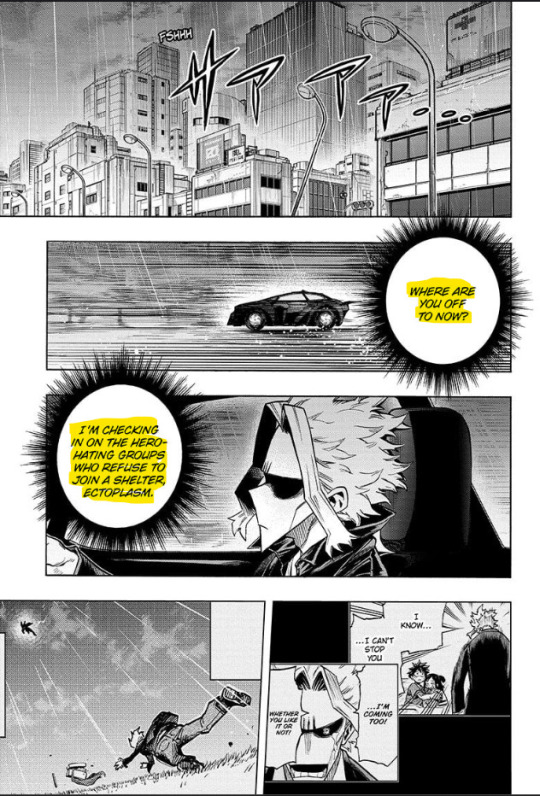
Aoimikans would also like to mention that Naomasa Tsukauchi just yelled, “You’re Quirkless!!!” for the whole world to hear. It wasn’t just the internal radio. La Brava has been broadcasting the fights in Japan for the ENTIRE world to see. Not only will the civilians in Japan wish for Toshinori Yagi’s success, but people around the world are glued to their screens at this very moment watching what’s happening in Japan.
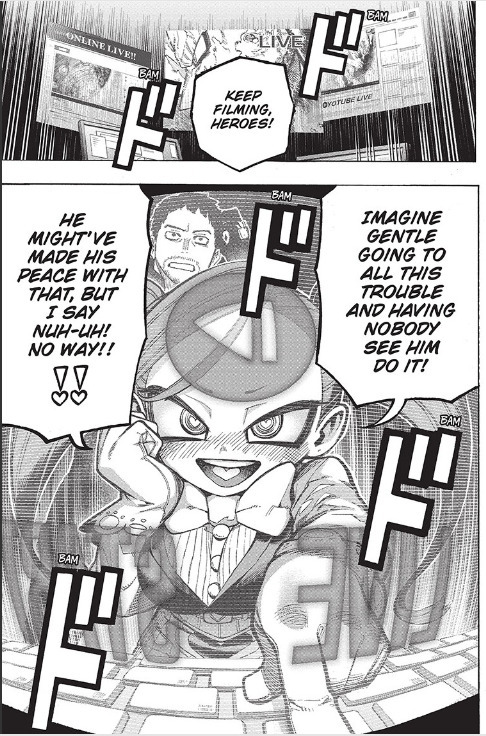
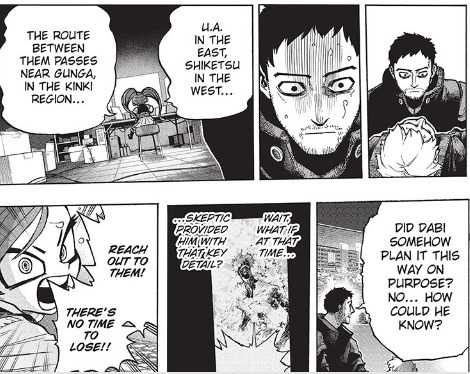

This theory that civilians will perhaps provide the backup needed for Toshinori to succeed in prolonging the fight to stall AfO is not unrealistic... Well, Aizawa said it best.

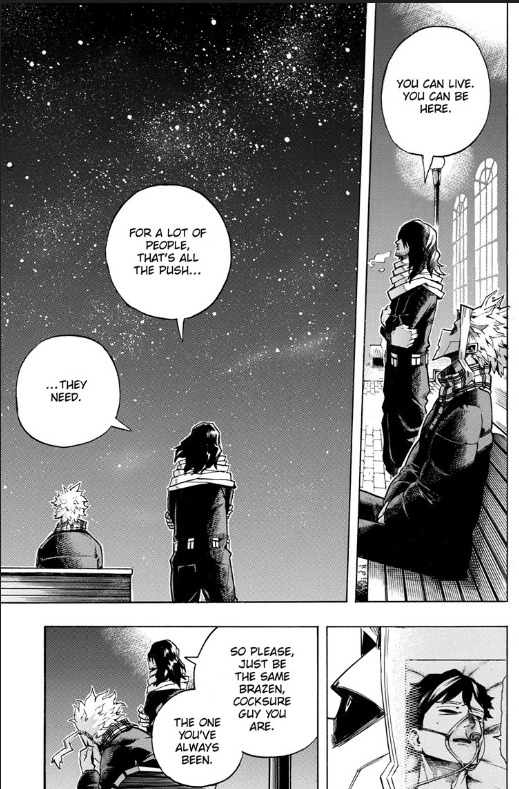
What is more brazen and cocksure than Toshinori going out to fight All for One, alone, while Quirkless? Of course the civilians Toshinori met personally would be inspired to action by him.
Additionally, we have an additional theory as to how a crowd of civilians could help (beyond the hoping and wishing and and possibly watching on screens if someone is out there to record the fight) and it is connected to altered fate, the will of a person, how Quirks work, Quirkless people being heroes, and All for One’s current condition.
Whereas All for One has known motives and flaws…
What do we know about All for One?
We know he grew up idolizing the villain from his younger brother’s comic books, believing they would win despite him not reading to the end of the story. We know he was obsessive over keeping his brother to himself.
We know he grew in power and influence by using his Quirk to steal other Quirks and gave Quirks to those seeking power in exchange for their service. He bought loyalty when he could and dished out terror when he could not. We know he created mindless servants called Noumu with the doctor’s help.
We know he has been chasing the vestige of his brother and has killed the other holders of One for All in his pursuit.
All for One is an apt name for his Quirk and himself. He wants to take all things for himself and take revenge on those who get in his way: the previous One for All users, any person that betrays him like Nagant, and—most notably—All Might.
However, the All for One we are most familiar with is the 200+ year old man who has time and patience to spare, the All for One who plays the long game. That All for One no longer exists.
What do we know about the current All for One?
The current All for One is on a time limit. He is vicious and powerful, pushing the Quirks he has taken to their fullest power. He takes Quirks without hesitation when he can get a hand on someone, whether he needs them or not.
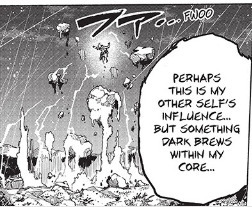

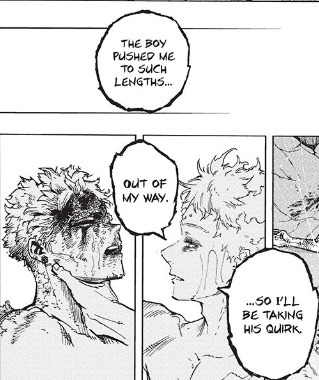
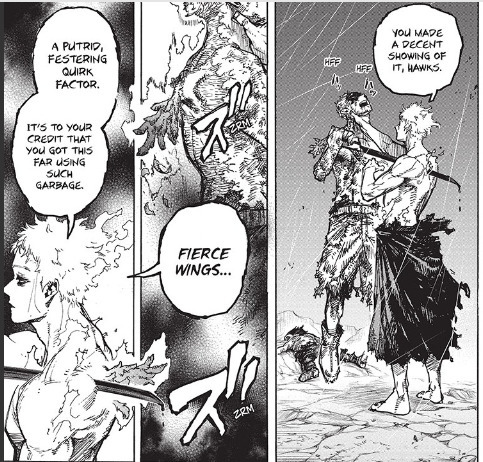
This All for One is impatient and acts without that same careful consideration of the All for One that played the long game. He is rushing to get to Shigaraki in order to save himself, and still he could not resist the pull of his anger, his hatred for All Might.
This All for One is not the rational thinking villain he was, and he cannot contain or fully control the Quirks in his body. Toshinori knows this, and this spells AfO’s doom.
Whereas understanding the nature of Quirks is critical to this fight…
Aoimikans and I love talking and theorizing about Quirks. Just take our ongoing fan-fiction with @toshinoumu. We only used what we knew was canon, expanded on those ideas, and ended up predicting the High End Noumu (years in advance), the Doctor’s involvement, and a number of facts about Quirks. Quirks are really cool to explore, and understanding how they work is crucial to understanding the overall story.
What are Quirks? Quirks are not just powers, they are a vital part of the person that has one. 個性 or “kosei” has a more literal translation than “Quirk.” 個性 “Kosei” translates to “individuality.”
Why is it significant that they aren’t just abilities or mutations? Quirks reflect the person and the person is often compelled by the kind of Quirk they have. The most prominent examples are those persons with Quirks that affect their actions in a negative way. Toga’s Quirk drives her desire to drink blood and become another person. La Brava’s Quirk requires her to love someone and to express that love in order to be used, which was detrimental to her relationships in her youth and critical for her partnership with Gentle.
Quirks can and have affected the thinking of the person who has them. It’s a little chicken-before-the-egg when it is the person’s own Quirk, but it is critical when we consider those given Quirks that either “don’t suit them” or when we look at the multi-Quirked Noumu.
Ill-suited Quirks. In the case of Quirks that don’t suit a person, let’s look at Aoyama and Shigaraki. Aoyama was Quirkless before AfO gave him the Navel Laser. His body was physically pained by the ill-fitting Quirk. That’s a physical drawback. How about mental? We have theorized since Tenko’s backstory was revealed that AfO was the man in the doorway and that he gave Tenko the Quirk Decay (and may have taken Air Walk from him, see previous meta post MHA: Fling Theory for the section on Tenko and the man in the doorway). The trauma of awakening Decay as well as the introduction of whatever mental influence having Decay, a Quirk that’s only use seems to be destroying, turned Tenko into Shigaraki, the villain that wants to destroy everything.
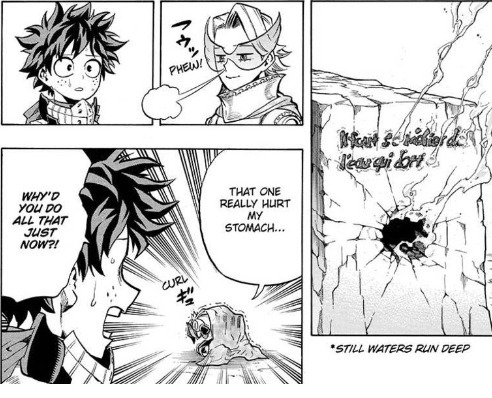
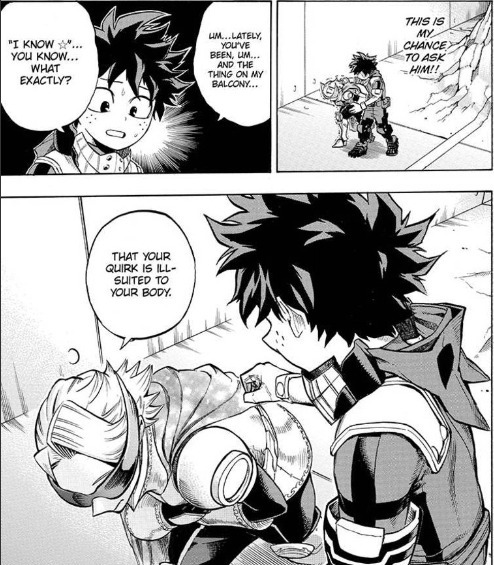
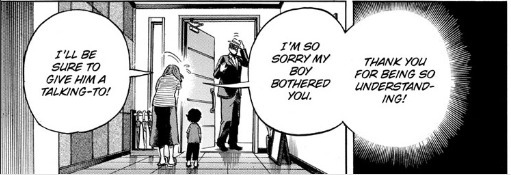

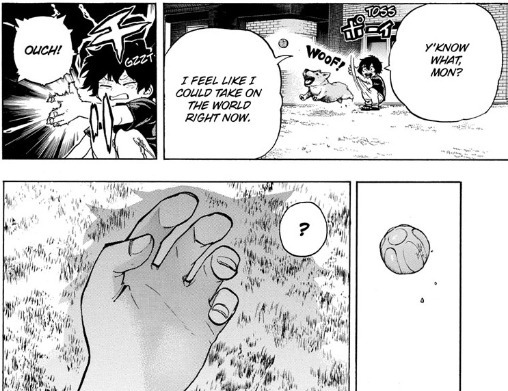
What’s up with Noumu? Noumu are the product of having multiple Quirks forced into one body. The mind becomes overwhelmed and the Noumu becomes an obeying puppet who acts according to the will of their master at the sound of their voice.
How being Quirkless makes a difference: In addition to what we know about Noumu, we know from the record of the previous users lives that One for All was difficult for the previous users to carry and live for very long—the longest lived being the 4th user who died of old age at 40, not an old age. The only users who were not as impacted in this way were Toshinori and Izuku who were Quirkless.
It’s clear that Quirks—particularly multiple Quirks—can negatively impact the wrong body, and it is more than physical. It’s mental and it’s in a way spiritual.
Quirks carry the spirit of the person, their dreams, and their will. That piece lives on and persists.
We know because of One for All that the will and spirit of the previous OfA users lives on with thoughts and wills of their own. We have seen the vestiges of not only the OfA users, but also the ghostly silhouettes of the Quirks within All for One and the parasitic All for One that is within and attached to Shigaraki. We have seen what happens when Shigaraki-AfO takes in a Quirk whose will challenges his own—Star’s Quirk revolted inside his mindscape and destroyed some of the Quirks within. We have seen AfO attack the Quirks’ ghostly vestiges that tried to stop him when he was fighting Jirou, Tokoyami, Dark Shadow, and Hawks.
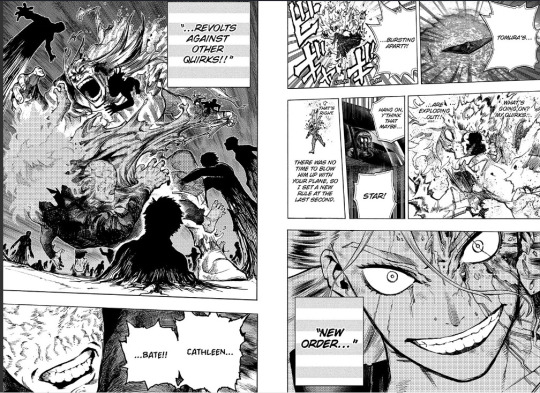
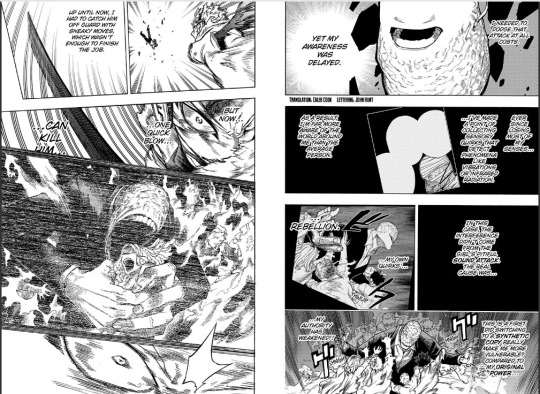
All for One even elaborated on his own experiences with the consciousnesses of those Quirks he stole and explained how OfA carried the consciousnesses of the users forward.
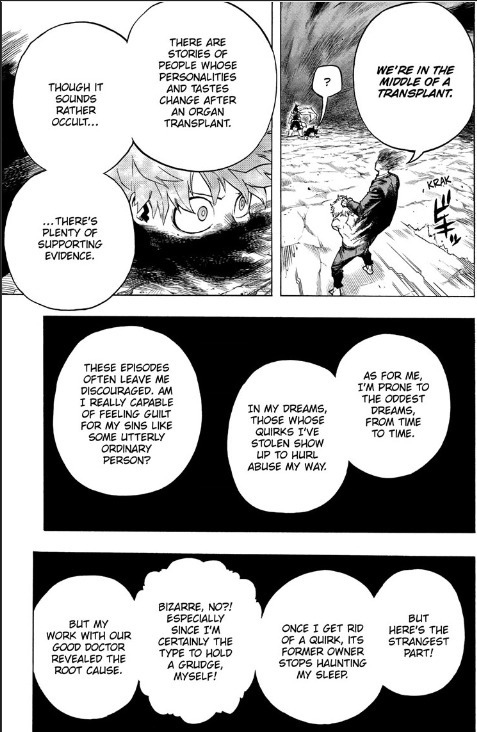


With that understanding, it isn’t hard to see how a Quirk like All for One could influence or match All for One’s desires and actions. He is driven to take Quirks. And given that AfO himself admits to be haunted by the consciousness from other people who can rebel against him, it makes sense that he has had to practice some kind of focus to keep himself from experiencing the drawbacks of having Quirks that rebel within him.
A mental focus, current All for One lacks.
Whereas All for One wrote himself out of the story chapters ago…
The All for One who played the long game gave himself one last tool to rewind his body to its prime, but it was one and done. One use, no going back. Yes, in using this card, he was able to grow more powerful with the knowledge he would disappear. No, I don’t believe he used it with a full understanding of what that would do to his mind.
In using this last ditch card, he wrote himself out of the story.
All for One is as self-serving as he always has been, but now he is being rash. He’s looking to reunite with Shigaraki-AfO to become one again before he really does disappear. As he regresses and de-ages, he is not in full rational control of his desires. He takes Quirks without needing to, he isn’t holding the Quirks he uses back, and when faced with Toshinori Yagi, he cannot help but stop regardless of his time limit.
Aoimikans and I have theorized for some time that AfO could be overwhelmed by Quirks he takes into himself. This could, if we are correct about a number of predictions, be a key factor in the coming fight.

What would happen if he is stalled, short on time, not in control of his desires and acts irrationally, and his fight with Toshinori doesn’t go as well as he wants?
What would happen if a crowd of civilians acted with heroic impulse to help Toshinori? And what would happen if all those people shared a singular idea, a singular focus of will, to help save Toshinori and defeat All for One?
What would happen if All for One acted on an uncontrolled impulse and decided to take and take and take those Quirks from people who come to help Toshinori?
What would happen if his focus slips and the rebelling spirits of Quirks he stole—including Hawks’ spirit—fight back from within?
What happens when Toshinori proves a Quirkless person can be a hero? Could someone, or many people, become heroes by becoming Quirkless?
Could the man who takes everything for himself be defeated by Toshinori, the man who gave all of himself for the world, and all those who may give up a piece of themselves to help Toshinori?
Whereas I stop being so long winded and summarize…
This is the final fight between Toshinori and All for One. Toshinori is at the greatest height of his post-Kamino character arc—Quirkless, heroic, confident, and determined. All for One may be at his physical best, but he is at his mental weakest and doesn’t have long before his own actions rewind him out of existence. Toshinori only has to stall, and he will be successful in that endeavor—though may be injured in the process. Toshinori will possibly get some help from Stain since he is nearby and wants to die by All Might’s hands anyway, might have to settle for dying for him.
Toshinori will live because his character arc bends in that direction, no other outcome makes sense or would be a satisfactory ending. His death wouldn’t help Izuku, wouldn’t add to the story, and so cannot happen.
The pairs for the last big fights are coming together. The Todoroki family vs Dabi/Touya. Toshinori Yagi vs All for One. Izuku and Bakugou vs Shigaraki. And probably back to Toga and Uraraka at some point as well as Kurogiri, Mic, and Aizawa.
All for One’s current mental state puts him in an internal dilemma. He is not in full rational control of himself and therefore is ripe for rebellion from within! All the vestiges of Quirks stolen—past and present—could very well help to confuse/stall him during the fight with Toshinori. As they already have in his fight with Jirou, Tokoyami, and Hawks.
Citizens could also come to Toshinori’s aid and add their will to his, which could very well help alter Toshinori’s “terrible death” fate. Also, they could possibly become Quirkless if AfO lets his dark urges take control and takes their Quirks (which would only make his mental situation worse), and be heroes in that moment with Toshinori.
All for One will fall at Kamino. He will rewind and rewind…
We aren’t sure what happens to AfO if he reaches a child-like age. Will he be the same person, only less controlled? Or will we see a sad, childish side of All for One that just wants his brother back? If so, would Toshinori sit with this lost child until the end? Horikoshi has a tendency to show the child within the characters so far, it isn’t impossible AfO will get the same treatment.
Either way, everything supports the case for Toshinori Yagi living. We’ll see what comes next.
Thanks for reading! :3
#MHA386#MHA386Spoilers#Toshinori Yagi#All Might#MHA#BNHA#Toshinori LIVES#The Case for Toshinori Yagi Living#All for One#AfO#One for All#OfA#Izuku Midoriya#Naomasa Tsukauchi#WE WORKED ON THIS ALL WEEKEND#FORMATTING THIS WAS A PAIN#Toshinoumu#For our readers
256 notes
·
View notes
Text
coke capitalism in 3x06 “what it takes”
in the evening, after the candidates’ dinner, logan calls the establishment candidate dave boyer, inviting him to meet and asking if he’ll “run [him] over a coke.” on a superficial level, this is a simple fuck-you: assigning a bitch-boy task to the man who needs logan’s support in order to become the next president. however, the choice of coke specifically is highly significant to the episode’s political commentary.
coca-cola’s brand image is deeply linked to the american empire (’cocacolonization’) and a rosy, propagandised image of capitalism in general. when logan asks boyer for a coke, we can read this as symbolic of the relationship he wants waystar and potus to have. the president should run errands for logan roy, specifically in a way that subordinates the political office and the state to waystar’s economic needs and the economy in general.
this is an inversion of older forms of capitalism, like 18th-century court capitalism, wherein corporations were allowed to exist and granted economic privileges only insofar as they served the interests of the state / sovereign. waystar has some value to the american empire, insofar as it exports soft power globally and manufactures consent domestically. but the balance of the relationship between logan and potus clearly tilts in logan’s favour multiple times throughout the show, and demanding the coke is essentially logan telling boyer he expects this arrangement to continue, literally asking the president to bring him american capitalism for his own consumption.
meanwhile, roman meets with mencken in logan’s bathroom (the gold accents in the bathroom, in combination with the coca-cola, also evoke a certain trumpian quality in logan). while mencken denies being a “dancing monkey,” roman understands that atn’s goal is to peddle whatever sells—in this case, fascism, which is particularly well-suited to spectacle and therefore to tv.
thus, when mencken brings logan a coke after all, he’s conveying two messages. one, that he’s willing to ‘play nice’ with logan. two, that his brand of fascist spectacle will actually do a better job than establishment republicanism of encoding american politics as flows of pure capital. analogously to the eminently consumable soda, this arrangement will melt down all political meaning and transform it into brute monetary value that waystar can use.
by kissing the coke, however, mencken makes it impossible for logan to actually drink it: it’s now been tainted, both by literal germs and by homoeroticism. this is where roman’s role is critical. unlike logan, roman is openly aroused by fascist masculinity, hence his literal flirting with fascism in the bathroom. roman is able to consume the coke, taking a political-economic waste product into his body and ‘consummating’ the deal logan has just made. roman’s body thus serves as both a waste receptacle and a symbolic representation of how american capitalism ‘gets into bed’ with fascism.
on a meta level, the choice of coke is also quite funny because we can presume that coca-cola paid for that product placement, or at least permitted it. despite the fact that the scene and the show have plenty of unflattering things to say about capitalism and fascism, the value of product placement on a popular tv show will always trump any critique being made within the show itself. capitalism is capable of absorbing any criticism of itself simply by selling it: in this case, ‘tv show’ is both an art form and a commodity, and no radical critique internal to the text is capable of altering the underlying economic relation.
187 notes
·
View notes
Text
Long, rambling, general post (with some detours into Austen + SW):
I find the academic obsession with novelty (at least in my field) rather irritating and in some ways actively harmful. But I've been thinking about it as I work on my dissertation, and there is an underlying concept I do find important.
Over here, I'm pretty content to scream my opinions at no one in particular, and have fun if people end up (courteously) answering back. But while there are commonalities between fandom meta practices and academia, a major difference (again, at least in my field) is that in academia, you essentially have to familiarize yourself with the wider community and discourse, and engage with it.
In literature, at least, it's important that you're not just reaching interpretations in a functional vacuum—interpretations that may well have been reached and argued thoroughly and well before. If you've got something fresh to contribute to the overall conversation, okay—maybe you basically agree with another interpretation but feel it could be expanded upon or there are some nuances that got missed. But the conversation doesn't particularly benefit from people just echoing the exact some interpretations over and over without adding or modifying them at all.
To put it another way, not everyone needs to (or should) cover every interpretation they agree with. This is not exactly literary criticism's reputation, but it's fundamentally social. Not everyone needs to do everything. Different people can and should cover different ground, and the general discussion benefits from this.
But this post isn't really about academia.
I think there's some real value in this idea that not everyone needs to be seen to repeat every correct take, or every take they agree with. Sometimes you're not really equipped to add anything. Sometimes you're not the best judge of a particular issue because it's not in your ballpark. Sometimes the ground has been so thoroughly covered in wider social discourse that you don't really need to add to it.
And I think this is especially important when it comes to the Internet firehose. People essentially repeating the same thing over and over and over without adding anything significant is a major way that ideas—including mistaken ideas—spread so quickly. Sometimes it's fairly inane jokes that become inescapable for an OP or within a fandom or whatever (book Isildur fans unite!). Sometimes it's mistaken or irrelevant corrections that someone/some people get bombarded with because no one bothers to check if the corrections have been made already. Sometimes it's the same reply ad nauseam, which quickly becomes intensely irritating while adding nothing. Sometimes it's worse than that—wrongheaded or exaggerated attacks on someone's character that get launched at the person incessantly, or active disinformation.
But basically, I think it's worth considering the shape of the overall discussion when you're considering what you specifically are going to contribute to it, if anything. Sometimes this is very serious. Sometimes it's a minimal consideration for others and for your impact on the general atmosphere in a fandom or some other social context.
For instance: back in 2005, when the Keira Knightley/Matthew Macfadyen Pride and Prejudice came out, my part of Austen fandom was having absolute conniptions over it. Some of this was over literally any adaptation of P&P ever being made after the 1995 mini-series (especially anyone else ever playing Darcy). Some of this was over claims that the 2005 P&P was generally more Brontë than Austen. Some of it had to do with particular contractions, or certain depictions of characters, jokes, aesthetics, dialogue, etc. I remember very serious articles about how it was a flash in the pan that would soon disappear from cultural consciousness (lol).
I actually share a number of the criticisms, as it happens! But I thought (and still think) that the collective outrage was ... excessive, at best. So I mostly didn't talk about my personal gripes because they already seemed to disproportionately dominate the conversation (to me, etc), and I didn't want to add to it. But it interests me that people have sometimes assumed that not personally adding to the griping about it means that I love it (and often, that I need to be corrected from doing so!). The same thing happens with particular ships or dynamics I don't like but don't want to add to discourse about.
I've definitely erred in the other direction. I used to talk quite a bit more about my criticisms of the Star Wars prequels, for instance, which I later regretted despite still having those criticisms. The fandom rage was just so over the top and everything covered so exhaustively and excessively by others that it (very belatedly) started to feel like adding to it was kind of like kicking a dog.
On the flipside, sometimes the firehose is pointed the opposite way from my personal opinion, and even if that opinion is just a mousy little cheep amidst the roar of approval/disapproval, voicing it seems more appropriate to me than joining a stampede of disproportionate hatred. Or sometimes the general discourse is pretty mixed and you just have to exercise judgment about your role in it (I've definitely gone for "I see a lot of debate on this point and hell with it, I get a place in the ring, too").
But in any case, I think that the pressure to be seen to have a take all the time and the assumptions made about people if they don't individually weigh in on ... basically everything is really misguided. We're social creatures! Sometimes ground has already been thoroughly covered. Sometimes it's been covered far too much. And I think stopping to think of what we're really adding, even when we're not plodding through reviews of the literature in academia, can be worth attempting.
#anghraine babbles#ivory tower blogging#general fanwank#austen blogging#austen fanwank#sw fanwank#long post
95 notes
·
View notes
Text
There's a fundamental disconnect between my view of Star Wars and that of, well.... the majority of the SW fandom these days. Whether this is due to lingering disdain for the Prequels (despite fandom claims of acceptance, there's still plenty of prequels-hate going around, it's just taken on a different guise) or the constant onslaught of Disney’s big-budget fanfic muddying the waters, or a combination of both, I don’t know.
But ultimately, it's quite simple. I view 'Star Wars' as the Skywalker saga...aka the six-film Lucas saga, which tells the story of Anakin Skywalker's rise, fall, and redemption. I don't personally see 'Star Wars' as some ongoing, open-ended franchise that can or even should have indefinite *canonical* additions to it. (An optional expanded universe is one thing, but additions that we, as fans, are just supposed to accept as canon without question because Disney says so is another thing entirely.) Because 'Star Wars' is not just some cinematic universe that exists for its own sake. The fact is, almost the entirety of the world-building from the Lucas-era was done in service of the story and characters of the Original Trilogy and the Prequels. The galaxy far, far away was created specifically to be the backdrop for the Skywalker saga.
So when people debate topics like ‘pro-Jedi’ vs. ‘Jedi critical’, I’m often unable to relate to the angle that these discussions take because I feel like they are largely missing the point. Story-wise, the Jedi don’t exist for their own sake, they (along with the Jedi vs. Sith struggle) are simply part of the mythic backstory of the saga. As a concept, the Jedi exist primarily to serve Anakin and Luke’s respective journeys. So, the Jedi Order of the Prequels-era is written as having become rigid and flawed because that is the necessary context for Anakin’s fall to the Dark Side. And likewise, Luke bringing Anakin back to the Light through the power of love and familial bonds is what rectifies the Old Order’s failings and thus restores the Jedi to the galaxy.
That's just... the story. As in, how it was told. So when I write meta about the Prequels and Original Trilogy, and how they work together as one story, my descriptions and interpretations of both the Jedi Order and the Jedi religion (these are related but not exactly the same thing) are simply neutral in my mind. I'm just talking about what the story is trying to convey. I can't relate to this idea that we must leap to the Jedi Order's defense, nor the converse, that we must condemn the Jedi eternally for having lost their way by the time of the Twilight of the Republic. Rather, I step outside of the story for a moment, and look from the outside in to try to see what is happening from that perspective.
I'm not sure that everyone in the fandom is willing or even able to do that.
Whether that is because very few people actually appreciate the Skywalker saga as Lucas told it to begin with (many people still loudly proclaim that 'Star Wars sucks!', which leads me to believe they must not value the core story at its heart), or they have been so confused by the Disney nonsense that they think the 'new canon' has automatically overridden any meaning that once existed in the PT x OT saga...again, I don't know. I have purposefully tried very hard to stay away from any Disney-related SW discussions for years now, so this is just all what I've gleaned from glimpses here and there.
But it seems to me that many SW fans have trouble accepting that the concept of the Jedi (and the Sith) are inextricably linked to the Skywalker saga and the Skywalker saga alone. These things would never have been created in the way they were without that story. But to acknowledge this would means fans have to accept how central Anakin is to the entire thing. All of it exists for Anakin's story. There are fans who don't like this for a slew of reasons, whether it be that they became attached to a certain idea of the Jedi based on how they were portrayed in Expanded Universe stories that came out during the interim between RotJ and the release of the Prequels (stories that were largely jossed by Lucas' canon), or because they hate Anakin for in-story reasons and have never been able to accept that Star Wars is about him whether they like it or not.
It certainly doesn't help that Disney has played into this discomfort by largely ignoring Anakin (at least, until fan-demand forced their hand) or even outright denying his importance to the story as Lucas told it. (Anakin is the Chosen One whether Disney or fans want him to be or not. Being the Chosen One is not about whether he 'deserves' it, it's literally just his role in the story. And Lucas' saga simply doesn't work without Anakin in the central role.) If fans are confused and disoriented these days, I can't entirely blame them. Disney's version of SW doesn't 'match' the Lucas saga and in many places outright contradicts it. But everything can easily be made clear if people step back (and put aside the Disney stuff for a moment) and just look at the actual story being told in the PT and OT. Likewise, any debates about the Jedi can easily be resolved in the same way. It's really not about how much fans like the Jedi as a group or as individual characters, or how much fans might wish they could be a Jedi themselves. It's about the role the Jedi play in the story, and it's about acknowledging whose story it really is.
#anakin skywalker#anti-disney#the jedi religion#the jedi order#the prequels#original trilogy#pro-Lucas saga#the skywalker saga#the real skywalker saga
70 notes
·
View notes